The History Of The Actors’ Group (TAG)
2011-2012
| Compiling the history of any organization can be a great challenge, particularly when the core group is small and rather than chronicle events soon after each production was completed, had spent their energy towards merely keeping alive. So is the case with TAG. As it evolved from a creative curmudgeon to new theater kid on the block and then to becoming one of Hawaii's finest community theaters, all TAG could do was focus on its next production, for it had little time for anything else. Hence, this history has been cobbled together utilizing the recollection of participants at the time, dog-eared old files containing memorabilia and other information, photos that fortunately was taken then buried, newspaper articles, and recovered video footage that is often way past its prime if not damaged. Nonetheless, these are the sources to create the history of The Actors' Group, told in a series of posts chronicling time periods unique to its development. |
 HSTC once again held its awards at the Koolau Ballroom, where TAG would receive a total of 12 Po’okelas for the 2010-2011 season. These involved: Leading Male in a Play, Mathias Maas, Ghosts; Leading Female in a Play, Deborah Pearson, Gem of the Ocean, Laurie Tanoura, A Delicate Balance; Featured Female in a Play, Wendy Pearson, Gem of the Ocean; Featured Male in a Play, Curtis Duncan, Gem of the Ocean; Ensemble Play, Duets; Overall Play, Ghosts; Sound Design, Laurie Tanoura, The Miracle Worker; Light Design, Thomas Tochiki, Merry Christmas, Roberta; Sound Design, Carlynn Wolfe, Duets; An Adjudicator Special Award was given to Brad Powell for his translation of an original script, Ghosts. Of course the major highlight of the night was the presentation of the Pierre Bowman Award, the HSTC’s most prestigious award, to TAG’s Artistic Director, Brad Powell.
HSTC once again held its awards at the Koolau Ballroom, where TAG would receive a total of 12 Po’okelas for the 2010-2011 season. These involved: Leading Male in a Play, Mathias Maas, Ghosts; Leading Female in a Play, Deborah Pearson, Gem of the Ocean, Laurie Tanoura, A Delicate Balance; Featured Female in a Play, Wendy Pearson, Gem of the Ocean; Featured Male in a Play, Curtis Duncan, Gem of the Ocean; Ensemble Play, Duets; Overall Play, Ghosts; Sound Design, Laurie Tanoura, The Miracle Worker; Light Design, Thomas Tochiki, Merry Christmas, Roberta; Sound Design, Carlynn Wolfe, Duets; An Adjudicator Special Award was given to Brad Powell for his translation of an original script, Ghosts. Of course the major highlight of the night was the presentation of the Pierre Bowman Award, the HSTC’s most prestigious award, to TAG’s Artistic Director, Brad Powell.
Harvey – A Third Time Is A Charm For Sam Polson
 One of the things that had come to define TAG over the years was the fact that, often, it actually defied description. “Eclectic” would periodically be the word that reflected its seasons. TAG certainly was known for its dramatic productions, but it wasn’t all about drama. It did comedy, but again, it never was about just comedy. TAG did long-time American classics like, “Our Town,” did even Shakespeare (“As You Like It”), did powerful off-broadway hits like “Glengarry Glen Ross,” while at the same time always leaving room for original works like Nancy Moss’ “Anna.” This, was purposeful, and part of Artistic Director Brad Powell’s intent to make The Actors’ Group appeal to all audiences. About the only thing it didn’t do was big, grand, musicals, but this was because logistically, TAG’s small theater was not designed for such. But in presenting its plays, what also became noticeable was that TAG was always producing new productions, often producing plays that were never produced anywhere before in Hawaii. Rare was the occassion when it trodded out plays it had done before. In fact, at the time of the start of the 2011-2012 season, only two plays, “K2,” and “Harvey,” had ever had reprises. But of the latter, it had been over 10 years since the reprise was done, and so Brad selected it once again, largely because each of the two previous productions (in 2000-2001 and 2001-2002) brought great reviews and commercial success. Something, for certain, was not overlooked. For while TAG prided itself on being the theater that produced plays it “wanted” to do, as opposed to “having” to do (for financial reasons), it also had to be mindful of its bottom line. “Harvey” had brought in the cash during its previous runs, so another try at it, given the separation of 10 years, seemed ripe for the times. Hence, the third run of “Harvey,” the story of affable Elwood P. Dowd and his six-foot invisible rabbit best friend, became a reality, and to bring it to life was the talented and dependable David Farmer, who would direct, and his wonderful wife, Loren, who would serve as his assistant director.
One of the things that had come to define TAG over the years was the fact that, often, it actually defied description. “Eclectic” would periodically be the word that reflected its seasons. TAG certainly was known for its dramatic productions, but it wasn’t all about drama. It did comedy, but again, it never was about just comedy. TAG did long-time American classics like, “Our Town,” did even Shakespeare (“As You Like It”), did powerful off-broadway hits like “Glengarry Glen Ross,” while at the same time always leaving room for original works like Nancy Moss’ “Anna.” This, was purposeful, and part of Artistic Director Brad Powell’s intent to make The Actors’ Group appeal to all audiences. About the only thing it didn’t do was big, grand, musicals, but this was because logistically, TAG’s small theater was not designed for such. But in presenting its plays, what also became noticeable was that TAG was always producing new productions, often producing plays that were never produced anywhere before in Hawaii. Rare was the occassion when it trodded out plays it had done before. In fact, at the time of the start of the 2011-2012 season, only two plays, “K2,” and “Harvey,” had ever had reprises. But of the latter, it had been over 10 years since the reprise was done, and so Brad selected it once again, largely because each of the two previous productions (in 2000-2001 and 2001-2002) brought great reviews and commercial success. Something, for certain, was not overlooked. For while TAG prided itself on being the theater that produced plays it “wanted” to do, as opposed to “having” to do (for financial reasons), it also had to be mindful of its bottom line. “Harvey” had brought in the cash during its previous runs, so another try at it, given the separation of 10 years, seemed ripe for the times. Hence, the third run of “Harvey,” the story of affable Elwood P. Dowd and his six-foot invisible rabbit best friend, became a reality, and to bring it to life was the talented and dependable David Farmer, who would direct, and his wonderful wife, Loren, who would serve as his assistant director.
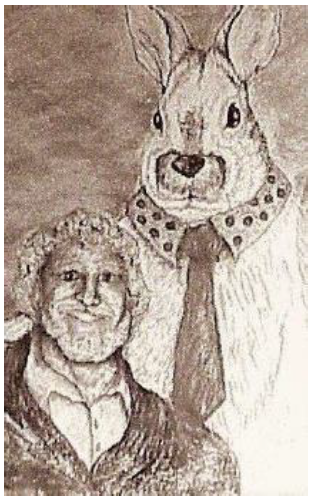 It is almost a certainty that the decision to stage “Harvey” again came with the understanding that Sam Polson would once again play the lead of Elwood P. Dowd. The thought of anyone else playing the role was just inconceivable. His captivating performance in both the 2000-2001 and 2001-2002 productions gained rave reviews and earned him Po’okela nominations for Best Actor by the HSTC. It was Sam’s favorite role, not only because of his TAG performances, but also because he had first played the role back in 1988 while he was in Washington, D.C. As part of the previous productions, and sure to be, this next production, Sam possessed a painting that showed Sam as Elwood standing next to ‘Harvey,’ the “Pooka” white rabbit (see inset photo right). It reflected his personal like of both the play and the character. So with Sam set to play Elwood again, the task was to surround him with the actors to play the other roles, and to this, David and Loren, got a winning cast. These included (character roles are in parentheses): Patricia Gillespie (Veta Louise Simmons); Kathy Bowers (Mrs. Ethel Chauvenet); Adriane Flower (Ruth Kelly, R.N.); D. Tafa’i Silipa (Don Wilson); Thomas Smith (Lyman Sanderson, M.D.); Bob Hamilton (William R. Chumley, M.D.); Lauren Ballesteros (Betty Chumley); Richard C. Goodman (Judge Omar Gaffne); S. Rick Crump (Ernie J. Lofgren); and of course, Harvey (Himself).
It is almost a certainty that the decision to stage “Harvey” again came with the understanding that Sam Polson would once again play the lead of Elwood P. Dowd. The thought of anyone else playing the role was just inconceivable. His captivating performance in both the 2000-2001 and 2001-2002 productions gained rave reviews and earned him Po’okela nominations for Best Actor by the HSTC. It was Sam’s favorite role, not only because of his TAG performances, but also because he had first played the role back in 1988 while he was in Washington, D.C. As part of the previous productions, and sure to be, this next production, Sam possessed a painting that showed Sam as Elwood standing next to ‘Harvey,’ the “Pooka” white rabbit (see inset photo right). It reflected his personal like of both the play and the character. So with Sam set to play Elwood again, the task was to surround him with the actors to play the other roles, and to this, David and Loren, got a winning cast. These included (character roles are in parentheses): Patricia Gillespie (Veta Louise Simmons); Kathy Bowers (Mrs. Ethel Chauvenet); Adriane Flower (Ruth Kelly, R.N.); D. Tafa’i Silipa (Don Wilson); Thomas Smith (Lyman Sanderson, M.D.); Bob Hamilton (William R. Chumley, M.D.); Lauren Ballesteros (Betty Chumley); Richard C. Goodman (Judge Omar Gaffne); S. Rick Crump (Ernie J. Lofgren); and of course, Harvey (Himself).
The Playbill For “Harvey” – TAG’s Third Rendition Of A Family Classic
 Sam Polson’s entry into TAG at the original Yellow Brick Studio on Keawe Street in the Kaka’ako District of Honolulu, occurred without fanfare. He was just a new actor brought into the scene study group by Lena Kaneshiro (who had met Sam at a film shoot), who was already a member. TAG founder Eric Nemoto remembers his first sight of Polson was seeing him doing “windmills” with his arms, one of the exercise routines that the group, led by Leigh Ann Kinghorn, would all participate in prior to starting the scene study sessions. But of course, he wasn’t like the rest of the group at the time. In a circle of young (20’s to 30’s) actors, Sam, already retired, with his full white beard, stood out. His difference was so stark that the collective group opinion among the rest of the regulars was that he wouldn’t be around for long. Nothing, as fate would have it, would prove further from the truth. In fact, not only would Sam turn out to be a fixture at TAG, his participation would prove to be transformational. He was, at the time, the only member who already had a significant resume in theater, and with that, he brought immediate credibility to a gang of novice (in terms of stage experience) actors. He had appeared in more than 40 stage productions in Hawaii and throughout the mainland, several feature films and numerous television commercials. Prior to stepping onto the stage, Sam was a career photo-journalist with 20 years of military service split between the U.S. Navy and the U.S. Air Force. His military assignments included: independent duty residing in Tokyo while producing books about aircraft carrier operations in the Far East; leading a camera crew documenting President John F. Kennedy’s funeral; covering five early space shots (including Apollo 13); covering aeromedical evacuations of wounded from Vietnam combat zones; and ending up with a two-year stint on President Richard Nixon’s Jobs for Veterans Committee aimed at helping returning Vietnam veterans find training and employment. After retiring from the Air Force in 1972, he held editorial posts on two national magazines before joining the faculty of the Catholic University of America in Washington, D.C., as a writer-editor-photographer with the university’s Public Affairs Office. One of the perks for faculty members allowed them to choose classes and attend tuition-free. Sam chose to attend playwriting classes and wound up being cast in the highly-regarded CUA drama department’s 1986 production of The Crucible. After setting foot on stage opening night before a 600-person audience, the acting bug bit Sam hard and never let go. Beyond his stage experience, Sam, along with his wife, Patricia Gillespie, produced documentary films such as their award-winning “They Call Her Lady Fingers: The Betty Loo Taylor Story.” Above all else, Sam was known for his full white beard which he treasured and maintained immaculately. He would tell everyone that as an actor he was open to any role as long as it didn’t require him to shave off his beard. He would say that his three favorite roles were playing Robert E. Lee in the two-man play (along with Earll Kingston), “We Meet At Appomattox,” (see filmed version to follow), appearing as Santa Claus on a contract basis, where he was the hit of hundreds of children over many years (the inset photo top left was from a commercial shoot for AT&T), and of course, as Elwood P. Dowd in “Harvey.” Of the latter, TAG’s third rendition of the Mary Chase classic would prove to finally get Sam the Best Actor Po’okela award he so richly deserved, making this portrayal, his third, the charm, as he had been nominated for the award after each of the previous productions in 2000-2001, and 2001-2002, but had not won. It was the crowning jewel to an acting career that had spawned decades, and symbolically would prove to be his final stint on stage, for he would come down with cancer in the years to come, and then pass away in 2013.
Sam Polson’s entry into TAG at the original Yellow Brick Studio on Keawe Street in the Kaka’ako District of Honolulu, occurred without fanfare. He was just a new actor brought into the scene study group by Lena Kaneshiro (who had met Sam at a film shoot), who was already a member. TAG founder Eric Nemoto remembers his first sight of Polson was seeing him doing “windmills” with his arms, one of the exercise routines that the group, led by Leigh Ann Kinghorn, would all participate in prior to starting the scene study sessions. But of course, he wasn’t like the rest of the group at the time. In a circle of young (20’s to 30’s) actors, Sam, already retired, with his full white beard, stood out. His difference was so stark that the collective group opinion among the rest of the regulars was that he wouldn’t be around for long. Nothing, as fate would have it, would prove further from the truth. In fact, not only would Sam turn out to be a fixture at TAG, his participation would prove to be transformational. He was, at the time, the only member who already had a significant resume in theater, and with that, he brought immediate credibility to a gang of novice (in terms of stage experience) actors. He had appeared in more than 40 stage productions in Hawaii and throughout the mainland, several feature films and numerous television commercials. Prior to stepping onto the stage, Sam was a career photo-journalist with 20 years of military service split between the U.S. Navy and the U.S. Air Force. His military assignments included: independent duty residing in Tokyo while producing books about aircraft carrier operations in the Far East; leading a camera crew documenting President John F. Kennedy’s funeral; covering five early space shots (including Apollo 13); covering aeromedical evacuations of wounded from Vietnam combat zones; and ending up with a two-year stint on President Richard Nixon’s Jobs for Veterans Committee aimed at helping returning Vietnam veterans find training and employment. After retiring from the Air Force in 1972, he held editorial posts on two national magazines before joining the faculty of the Catholic University of America in Washington, D.C., as a writer-editor-photographer with the university’s Public Affairs Office. One of the perks for faculty members allowed them to choose classes and attend tuition-free. Sam chose to attend playwriting classes and wound up being cast in the highly-regarded CUA drama department’s 1986 production of The Crucible. After setting foot on stage opening night before a 600-person audience, the acting bug bit Sam hard and never let go. Beyond his stage experience, Sam, along with his wife, Patricia Gillespie, produced documentary films such as their award-winning “They Call Her Lady Fingers: The Betty Loo Taylor Story.” Above all else, Sam was known for his full white beard which he treasured and maintained immaculately. He would tell everyone that as an actor he was open to any role as long as it didn’t require him to shave off his beard. He would say that his three favorite roles were playing Robert E. Lee in the two-man play (along with Earll Kingston), “We Meet At Appomattox,” (see filmed version to follow), appearing as Santa Claus on a contract basis, where he was the hit of hundreds of children over many years (the inset photo top left was from a commercial shoot for AT&T), and of course, as Elwood P. Dowd in “Harvey.” Of the latter, TAG’s third rendition of the Mary Chase classic would prove to finally get Sam the Best Actor Po’okela award he so richly deserved, making this portrayal, his third, the charm, as he had been nominated for the award after each of the previous productions in 2000-2001, and 2001-2002, but had not won. It was the crowning jewel to an acting career that had spawned decades, and symbolically would prove to be his final stint on stage, for he would come down with cancer in the years to come, and then pass away in 2013.
Sam Polson’s “We Meet At Appomattox” – The Meeting Of Grant And Lee As Directed By Brad Powell
The Star-Advertiser Review Of The Third Production Of “Harvey”
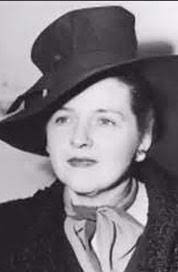 Mary Coyle Chase was born February 25, 1907, in Denver, Colorado. Her parents, Frank Bernard and Mary McDonough Coyle, came to the United States from Ireland, whose legends and folklore would later play a part in Mary’s writings. At the age of fifteen, she graduated from West High School (Denver) and attended both the University of Denver and the University of Colorado (Boulder). When she was eighteen, she became a newspaper reporter for the Rocky Mountain News, Denver’s oldest newspaper, and in 1928 she married fellow reporter, Robert L. Chase. She left the newspaper in 1931 to raise three sons and to work as a freelance writer. Throughout the rest of her life she wrote numerous children’s books, short stories, newspaper articles and plays. Harvey was by far her most successful work. She died in 1981 at the age of 74. Chase’s first plays brought her marginal success. Me, Third was produced by a Works Project Administration (WPA) theatre in Denver and was later produced on Broadway, renamed Now You’ve Done It. Her next play, Sorority House, was the most autobiographical of her plays. It played in Denver and was later made into a movie in 1939. Too Much Business, a children’s play, premiered in 1940 while A Slip of a Girl, a short comedy, was written and performed for army camps around the Denver area. In 1942 she began working on Harvey, a play about a friendly inebriate named Elwood P. Dowd and his invisible companion, a six-foot one-and-a-half inch white rabbit. Its inspiration came from two experiences in her life. The first was a dream she had about a psychiatrist being chased by a giant white rabbit. It reminded her of stories her Irish uncles had told about pookas, “mischievous goblins or spectors . . . in Irish folklore [who] appear only to those who believe in them.” The second inspiration came when one day she took notice of her widowed neighbor who had lost her only son in war just two months earlier. In reflection Chase asked herself: “Would I ever possibly write anything that might make this woman laugh again?” (Dictionary of Literary Biography, vol. 228. Twentieth-Century American Dramatists, p. 44). Hoping to bring laughter and respite to war-torn America, she set to work. The play took Chase two years to write, during which time she also wrote a weekly radio program for the Teamster’s Union. She would write in the evenings after her children were in bed and her husband had gone to work. Harvey was rewritten over fifty times and was finally submitted to New York producer Brock Pemberton who accepted it immediately. It opened to rave reviews on Broadway in 1944 and ran for four and a half years at the 48th Street Theatre. It played for a total of 1,755 performances, making it one of the longest running shows in Broadway history. Critic Louis Nichols was pleasantly surprised by Harvey, calling it “one of the delights of the season” (New York Times, 11 Nov. 1944). Other reviewers attributed its overwhelming success to “its escapist theme [that] appealed to audiences trying to take leave of the harsh realities of the world . . . during World War II” (Dictionary of Literary Biography, vol. 228. Twentieth-Century American Dramatists, p. 45). Following its success on Broadway, Chase received the Pulitzer Prize for Harvey as the best drama of the 1944-45 season. It also grabbed Hollywood’s attention. A 1947 New York Times article reported that Universal-International purchased the play with the intent of making it a movie for $1 million, more than any previously purchased play or book. In 1950 the movie starring Jimmy Stewart and Josephine Hull was also a great success, the latter receiving an Oscar for her performance. Chase continued to write, but nothing brought the kind of recognition and success that Harvey had. She believed in writing for the human spirit and her audience and in making people laugh. Her philosophy of life was one that Elwood P. Dowd reiterates in Harvey: “My mother used to say to me ‘In this world, Elwood, you must be oh, so smart or oh, so pleasant.’ For years I was smart. I recommend pleasant.” (https://www.bard.org/study-guides/about-the-playwright-harvey/)
Mary Coyle Chase was born February 25, 1907, in Denver, Colorado. Her parents, Frank Bernard and Mary McDonough Coyle, came to the United States from Ireland, whose legends and folklore would later play a part in Mary’s writings. At the age of fifteen, she graduated from West High School (Denver) and attended both the University of Denver and the University of Colorado (Boulder). When she was eighteen, she became a newspaper reporter for the Rocky Mountain News, Denver’s oldest newspaper, and in 1928 she married fellow reporter, Robert L. Chase. She left the newspaper in 1931 to raise three sons and to work as a freelance writer. Throughout the rest of her life she wrote numerous children’s books, short stories, newspaper articles and plays. Harvey was by far her most successful work. She died in 1981 at the age of 74. Chase’s first plays brought her marginal success. Me, Third was produced by a Works Project Administration (WPA) theatre in Denver and was later produced on Broadway, renamed Now You’ve Done It. Her next play, Sorority House, was the most autobiographical of her plays. It played in Denver and was later made into a movie in 1939. Too Much Business, a children’s play, premiered in 1940 while A Slip of a Girl, a short comedy, was written and performed for army camps around the Denver area. In 1942 she began working on Harvey, a play about a friendly inebriate named Elwood P. Dowd and his invisible companion, a six-foot one-and-a-half inch white rabbit. Its inspiration came from two experiences in her life. The first was a dream she had about a psychiatrist being chased by a giant white rabbit. It reminded her of stories her Irish uncles had told about pookas, “mischievous goblins or spectors . . . in Irish folklore [who] appear only to those who believe in them.” The second inspiration came when one day she took notice of her widowed neighbor who had lost her only son in war just two months earlier. In reflection Chase asked herself: “Would I ever possibly write anything that might make this woman laugh again?” (Dictionary of Literary Biography, vol. 228. Twentieth-Century American Dramatists, p. 44). Hoping to bring laughter and respite to war-torn America, she set to work. The play took Chase two years to write, during which time she also wrote a weekly radio program for the Teamster’s Union. She would write in the evenings after her children were in bed and her husband had gone to work. Harvey was rewritten over fifty times and was finally submitted to New York producer Brock Pemberton who accepted it immediately. It opened to rave reviews on Broadway in 1944 and ran for four and a half years at the 48th Street Theatre. It played for a total of 1,755 performances, making it one of the longest running shows in Broadway history. Critic Louis Nichols was pleasantly surprised by Harvey, calling it “one of the delights of the season” (New York Times, 11 Nov. 1944). Other reviewers attributed its overwhelming success to “its escapist theme [that] appealed to audiences trying to take leave of the harsh realities of the world . . . during World War II” (Dictionary of Literary Biography, vol. 228. Twentieth-Century American Dramatists, p. 45). Following its success on Broadway, Chase received the Pulitzer Prize for Harvey as the best drama of the 1944-45 season. It also grabbed Hollywood’s attention. A 1947 New York Times article reported that Universal-International purchased the play with the intent of making it a movie for $1 million, more than any previously purchased play or book. In 1950 the movie starring Jimmy Stewart and Josephine Hull was also a great success, the latter receiving an Oscar for her performance. Chase continued to write, but nothing brought the kind of recognition and success that Harvey had. She believed in writing for the human spirit and her audience and in making people laugh. Her philosophy of life was one that Elwood P. Dowd reiterates in Harvey: “My mother used to say to me ‘In this world, Elwood, you must be oh, so smart or oh, so pleasant.’ For years I was smart. I recommend pleasant.” (https://www.bard.org/study-guides/about-the-playwright-harvey/)
David and Loren were actively involved in all facets of the production, but also had the great fortune of having a great group of volunteers to serve as their crew (which included some of the cast). This included (positions and responsibilities in parentheses): D. Tafa’i Silipa (Stage Manager); S. Rick Crump (Best Boy); Andy Alvarado (Set Design/Construction); David C. Farmer, Loren Farmer, Sam Polson (Sound Design); Thomas Tochiki (Lighting Design); Thomas Tochiki, S. Rick Crump (Light & Sound Operators); Carlynn Wolfe (Costume Design); Greg Howell (Hair & Makeup); Andy Alvarado, Bob Hamilton, David Farmer (Set Dressing); and Jason Taglianetti (Photography).
TAG’s third production of Mary Chase’s, “Harvey,” opened on Friday, August 26th, 2011 at 7:30 p.m. It continued on Saturday, August 27th, 2011, also at 7:30 p.m. The next day, Sunday, August 28th, 2011, it continued with a matinee at 2:00 p.m. It subsequently played for three more weeks, with curtains rising at 7:30 p.m. on Thursday through Saturday night performances, and Sunday matinee performances at 2:00 p.m, for a total of 15 performances, closing on Sunday, September 18th, 2011. As in the prior two productions in which it was produced by TAG, it received very enthusiastic support from very good houses which made this production as successful overall as the others.
The Maestro’s Woman – Jan McGrath’s Biography Of The Legendary Italian Opera Composer, Giacomo Puccini
 Giacomo Antonio Domenico Michele Secondo Maria Puccini (see photo right), born December 22, 1858 and died November 29th, 1924), was an Italian composer known primarily for his operas. Regarded as the greatest and most successful proponent of Italian opera after Verdi, he was descended from a long line of composers, stemming from the late Baroque era. His most renowned works are La bohème (1896), Tosca (1900), Madama Butterfly (1904), and the unfinished Turandot (posthumously completed by Franco Alfano), all of which are among the most frequently performed and recorded in the entirety of the operatic repertoire. In addition to his renown as a composer, Puccini was also known for engaging in numerous affairs that punctuated his marriage. In 1884, Puccini began a relationship with a married woman named Elvira Gemignani, a former piano student of his. Elvira’s husband, Narciso Gemignani, was an unrepentant womanizer himself, and so Elvira’s marriage was not a happy one. Elvira became pregnant by Puccini, which resulted in the birth of their son, Antonio. Elvira, Antonio and Elvira’s daughter by Narciso, Fosca, began to live with Puccini shortly afterwards. Narciso was killed by the husband of a woman that Narciso had an affair with in early 1904, after which Puccini and Elvira were then able to marry and to legitimize Antonio. The marriage between Puccini and Elvira was also troubled by infidelity, as Puccini had frequent affairs himself, including with well-known singers such as Maria Jeritza, Emmy Destinn, Cesira Ferrani, and Hariclea Darclée. In 1909, Puccini’s wife Elvira publicly accused Doria Manfredi, a maid working for the Puccini family, of having an affair with the composer. After the accusation, Manfredi committed suicide. However, an autopsy determined that Manfredi had died a virgin, refuting the allegations made against her. Elvira Puccini was prosecuted for slander and was sentenced to more than five months in prison, although a payment to the Manfredi family by Puccini spared Elvira from having to serve the sentence. Some music critics and interpreters of Puccini’s work have speculated that the psychological effects of this incident on Puccini interfered with his ability to complete compositions later in his career, and also influenced the development of his characters such as Liù (from Turandot), a slave girl who dies tragically by suicide. It was this latter event that inspired playwright Jan McGrath to write her play, “The Maestro’s Woman,” which would then eventually lead to a dark night play reading at TAG during its 2011-2012 season.
Giacomo Antonio Domenico Michele Secondo Maria Puccini (see photo right), born December 22, 1858 and died November 29th, 1924), was an Italian composer known primarily for his operas. Regarded as the greatest and most successful proponent of Italian opera after Verdi, he was descended from a long line of composers, stemming from the late Baroque era. His most renowned works are La bohème (1896), Tosca (1900), Madama Butterfly (1904), and the unfinished Turandot (posthumously completed by Franco Alfano), all of which are among the most frequently performed and recorded in the entirety of the operatic repertoire. In addition to his renown as a composer, Puccini was also known for engaging in numerous affairs that punctuated his marriage. In 1884, Puccini began a relationship with a married woman named Elvira Gemignani, a former piano student of his. Elvira’s husband, Narciso Gemignani, was an unrepentant womanizer himself, and so Elvira’s marriage was not a happy one. Elvira became pregnant by Puccini, which resulted in the birth of their son, Antonio. Elvira, Antonio and Elvira’s daughter by Narciso, Fosca, began to live with Puccini shortly afterwards. Narciso was killed by the husband of a woman that Narciso had an affair with in early 1904, after which Puccini and Elvira were then able to marry and to legitimize Antonio. The marriage between Puccini and Elvira was also troubled by infidelity, as Puccini had frequent affairs himself, including with well-known singers such as Maria Jeritza, Emmy Destinn, Cesira Ferrani, and Hariclea Darclée. In 1909, Puccini’s wife Elvira publicly accused Doria Manfredi, a maid working for the Puccini family, of having an affair with the composer. After the accusation, Manfredi committed suicide. However, an autopsy determined that Manfredi had died a virgin, refuting the allegations made against her. Elvira Puccini was prosecuted for slander and was sentenced to more than five months in prison, although a payment to the Manfredi family by Puccini spared Elvira from having to serve the sentence. Some music critics and interpreters of Puccini’s work have speculated that the psychological effects of this incident on Puccini interfered with his ability to complete compositions later in his career, and also influenced the development of his characters such as Liù (from Turandot), a slave girl who dies tragically by suicide. It was this latter event that inspired playwright Jan McGrath to write her play, “The Maestro’s Woman,” which would then eventually lead to a dark night play reading at TAG during its 2011-2012 season.
The Playbill For “The Maestro’s Woman”
 From The Play Program: Jan Shiarella McGrath (photo left) began scriptwriting after many years of acting, directing, poetry writing, and editing works for the stage including Dante’s Inferno and Milton’s Paradise Lost. Her plays, The Maestro’s Woman, about Giacomo Puccini, and By Any Other Name, about Shakespeare and Christopher Marlowe, were presented as stage readings at Hawaii Pacific University’s Paul and Vi Loo Theatre. She has recently completed a contemporary screenplay, Home Free. Jan is elated that Victoria, her stage daughter and Belle of Amherst director, is interpreting The Maestro’s Woman.
From The Play Program: Jan Shiarella McGrath (photo left) began scriptwriting after many years of acting, directing, poetry writing, and editing works for the stage including Dante’s Inferno and Milton’s Paradise Lost. Her plays, The Maestro’s Woman, about Giacomo Puccini, and By Any Other Name, about Shakespeare and Christopher Marlowe, were presented as stage readings at Hawaii Pacific University’s Paul and Vi Loo Theatre. She has recently completed a contemporary screenplay, Home Free. Jan is elated that Victoria, her stage daughter and Belle of Amherst director, is interpreting The Maestro’s Woman.
“The Maestro’s Woman” came with a great, winning cast. These were as follows (roles are in parentheses): James Aina (Giacomo Puccini); Lala Buzzell (Donna Elvira Puccini, Giacomo’s mistress/wife); Jo Pruden (Mamma Albina Magi, Giacomo’s mother & Mamma Manfredi, Doria’s mother); Susan Killeen (Ramelde Franceschini, Giacomo’s sister); Bob Hamilton (Narcisco Gemignani, Elvira’s first husband); Peter Clark (Ferruccio Pagni, old friend of Giacomo & Pappa Manfredi, Doria’s father); Gary Culver (Ferelli, old friend of Giacomo & Priest); Lisa Barnes (Corinna, young law student, Giacomo’s mistress); Stacy Ray (Sybil, British friend and confidante of Giacomo); Sara Cate Langham (Doria Manfredi, a young servant); and John Wythe White (Narrator).
 Victoria Gail-White (see photo right), the director for “The Maestro’s Woman,” had been an active contributor to the Hawaii performing arts scene for years. In addition, she and husband (and fellow actor/writer), John Wythe-White, were two of the most dedicated benefactors to TAG, with their annual contributions to TAG’s fundraising efforts consistently helping to sustain the theater. “Maestro” was Victoria’s second directorial effort for TAG, after first directing playwright Jan McGrath earlier in the year (as a dark night production during the 2020-2011 season) in Tea with Emily Dickinson, A Staged Reading by Jan McGrath of Scenes from The Belle Of Amherst. But beyond that she had acted in productions with TAG in The Actor’s Nightmare, Rain, On Golden Pond, but especially for her riveting performance in The Goat or Who Is Sylvia in 2006, for which she won a Po’okela for leading female in a play. Victoria’s Maestro directorial effort preceded acting in yet another TAG production to follow, The Futrelle-ogy, where soon after Maestro closed she was then participating in rehearsals for that run.
Victoria Gail-White (see photo right), the director for “The Maestro’s Woman,” had been an active contributor to the Hawaii performing arts scene for years. In addition, she and husband (and fellow actor/writer), John Wythe-White, were two of the most dedicated benefactors to TAG, with their annual contributions to TAG’s fundraising efforts consistently helping to sustain the theater. “Maestro” was Victoria’s second directorial effort for TAG, after first directing playwright Jan McGrath earlier in the year (as a dark night production during the 2020-2011 season) in Tea with Emily Dickinson, A Staged Reading by Jan McGrath of Scenes from The Belle Of Amherst. But beyond that she had acted in productions with TAG in The Actor’s Nightmare, Rain, On Golden Pond, but especially for her riveting performance in The Goat or Who Is Sylvia in 2006, for which she won a Po’okela for leading female in a play. Victoria’s Maestro directorial effort preceded acting in yet another TAG production to follow, The Futrelle-ogy, where soon after Maestro closed she was then participating in rehearsals for that run.
“The Maestro’s Woman,” as it was essentially a staged reading, did not require a large crew. But what crew it had did an outstanding job. Director Jan McGrath created the Sound Design, Thomas Tochiki served as the Light and Sound Operator, Joyce Powell handled the phone reservations as well as supplied her, as usual, terrific goodies during intermission (see below), and Tom Holowach also helped with the production, as he, and Thomas, were accorded Special Thanks.
The Program Notice About “Joyce’s Goodies”
 The Original Event Invitation
The Original Event Invitation
“The Maestro’s Woman” played for two performances, Friday, September 23rd, 2011, and Saturday, September 24th, 2011. Both shows opened at 7:30 p.m. It drew a good crowd of devoted patrons who enjoyed Jan McGrath’s contribution to the legend of Puccini, who all stayed after the reading was concluded for a great question and answer discussion about the play with wine being available for a donation.
The Futrelle-ogy – A Comedy Trilogy That’s A First Of Its Kind For TAG
 It was years prior, and TAG Artistic Director Brad Powell (see inset photo left) was directing and choreographing the National Tour for the internationally renowned, singing and dancing group, “The Young Americans.” The tour was based on the life and music of George Gerswhin and included the complete, “An American In Paris,” ballet. Among the 30 talented young people he had the pleasure of working with were two men, each about 19-years-old, Marc Cherry and Jamie Wooten. Two years after the tour ended, after both Cherry and Wooten had stayed in L.A., they joined forces and became writers on the well-loved television series, “The Golden Girls.” Later, Marc would go on to create the TV series, “Desperate Housewives,” and Jamie would join with Jessie Jones and Nicholas Hope to become playwrights, writing for the theater. This trio of talented writers would develop the reputation of being three of the most widely-produced comedic playwrights in America. When Brad met with Jamie and Nick during TAG’s 2010-2011 season, he asked them what they would like to see presented on the TAG stage. Jamie said that no one had ever done “The Futrelle-ogy,” the trilogy of three plays they wrote – “Dearly Beloved,” “Christmas Belles,” and “Southern Hospitality” – in rep. What “rep” reflected was “repertory theatre,” where “doing plays in rep” meant the actors would perform a selection of plays in rotation, often changing the play each night. And so Brad, always challenged by things that had never been done before, set his mind towards creating a production that featured “The Futrelle-ogy” alternating its shows on different nights.
It was years prior, and TAG Artistic Director Brad Powell (see inset photo left) was directing and choreographing the National Tour for the internationally renowned, singing and dancing group, “The Young Americans.” The tour was based on the life and music of George Gerswhin and included the complete, “An American In Paris,” ballet. Among the 30 talented young people he had the pleasure of working with were two men, each about 19-years-old, Marc Cherry and Jamie Wooten. Two years after the tour ended, after both Cherry and Wooten had stayed in L.A., they joined forces and became writers on the well-loved television series, “The Golden Girls.” Later, Marc would go on to create the TV series, “Desperate Housewives,” and Jamie would join with Jessie Jones and Nicholas Hope to become playwrights, writing for the theater. This trio of talented writers would develop the reputation of being three of the most widely-produced comedic playwrights in America. When Brad met with Jamie and Nick during TAG’s 2010-2011 season, he asked them what they would like to see presented on the TAG stage. Jamie said that no one had ever done “The Futrelle-ogy,” the trilogy of three plays they wrote – “Dearly Beloved,” “Christmas Belles,” and “Southern Hospitality” – in rep. What “rep” reflected was “repertory theatre,” where “doing plays in rep” meant the actors would perform a selection of plays in rotation, often changing the play each night. And so Brad, always challenged by things that had never been done before, set his mind towards creating a production that featured “The Futrelle-ogy” alternating its shows on different nights.
The Playbill For “The Futrelle-ogy”
 Jessie Jones, Nicholas Hope and Jamie Wooten, collectively known as JONES HOPE WOOTEN, enjoy the reputation of being three of the most popular and widely-produced playwrights in the United States. They specialize in writing laugh-out-loud comedies and creating vivid strong roles for women. Because of their commitment to and support of local theatres across the nation, they’ve built a following with legions of loyal fans and have been dubbed “America’s Playwrights.” Between them, they’ve written classic television, hit movies, Off Broadway comedy and their plays are published by Dramatists Play Service and TRW Plays – Theatrical Rights Worldwide. Thousands of productions of their comedies – including their perennially-popular THE SAVANNAH SIPPING SOCIETY, DEARLY BELOVED, CHRISTMAS BELLES, THE RED VELVET CAKE WAR, ALWAYS A BRIDESMAID and many more – have entertained millions of theatre-goers across America, as well as in Canada, Denmark, Japan, Netherlands, Australia, Germany, Ireland, Mexico, the Virgin Islands, England, Taiwan, France, Sri Lanka, South Africa, Scotland, Belgium, Panama, New Zealand, Bulgaria, Ecuador, Kenya, Northern Ireland, and The Czech Republic. Jessie Jones co-authored the Off-Broadway comedy, DEARLY DEPARTED and its hit feature film adaptation, Kingdom Come, released by Fox Searchlight Films. Her short stories have been published in literary journals and she has written scripts with projects at ABC, Lifetime, WB, TNT, Paramount and an animated series for Walt Disney Productions. Nicholas Hope, winner of the Texas New Playwrights’ Award, was Director of Casting for Theatre Communications Group in New York, The Goodman Theatre in Chicago and ABC Television in New York and Los Angeles. With Jessie Jones, he wrote for the Emmy-winning Disney television series Teacher’s Pet. Together with Jones and Wooten, Nicholas wrote for USA, WB, UPN, SYFY, Nickelodeon and Fox. Jamie Wooten was a writer and producer for many seasons of the classic television series The Golden Girls, where he won the Writers Guild of America award. He co-created the CBS series, The Five Mrs. Buchanans, and was the executive producer of the Fox comedy, The Crew, NBC’s For Your Love and UPN’s Half & Half. A Billboard Award-winning songwriter, Jamie has written tunes for television and film. Between them, Jessie, Nicholas and Jamie have written for an astonishingly diverse roster of performers, including Nathan Lane, Whoopi Goldberg, Betty White, Jack Black, Debbie Reynolds, LL Cool J, Harvey Korman, Tim Conway, Tyne Daly, Bea Arthur, Louie Anderson, Taraji P. Henson, George Burns, RuPaul, Dolly Parton and many, many more. (joneshopewooten.com)
Jessie Jones, Nicholas Hope and Jamie Wooten, collectively known as JONES HOPE WOOTEN, enjoy the reputation of being three of the most popular and widely-produced playwrights in the United States. They specialize in writing laugh-out-loud comedies and creating vivid strong roles for women. Because of their commitment to and support of local theatres across the nation, they’ve built a following with legions of loyal fans and have been dubbed “America’s Playwrights.” Between them, they’ve written classic television, hit movies, Off Broadway comedy and their plays are published by Dramatists Play Service and TRW Plays – Theatrical Rights Worldwide. Thousands of productions of their comedies – including their perennially-popular THE SAVANNAH SIPPING SOCIETY, DEARLY BELOVED, CHRISTMAS BELLES, THE RED VELVET CAKE WAR, ALWAYS A BRIDESMAID and many more – have entertained millions of theatre-goers across America, as well as in Canada, Denmark, Japan, Netherlands, Australia, Germany, Ireland, Mexico, the Virgin Islands, England, Taiwan, France, Sri Lanka, South Africa, Scotland, Belgium, Panama, New Zealand, Bulgaria, Ecuador, Kenya, Northern Ireland, and The Czech Republic. Jessie Jones co-authored the Off-Broadway comedy, DEARLY DEPARTED and its hit feature film adaptation, Kingdom Come, released by Fox Searchlight Films. Her short stories have been published in literary journals and she has written scripts with projects at ABC, Lifetime, WB, TNT, Paramount and an animated series for Walt Disney Productions. Nicholas Hope, winner of the Texas New Playwrights’ Award, was Director of Casting for Theatre Communications Group in New York, The Goodman Theatre in Chicago and ABC Television in New York and Los Angeles. With Jessie Jones, he wrote for the Emmy-winning Disney television series Teacher’s Pet. Together with Jones and Wooten, Nicholas wrote for USA, WB, UPN, SYFY, Nickelodeon and Fox. Jamie Wooten was a writer and producer for many seasons of the classic television series The Golden Girls, where he won the Writers Guild of America award. He co-created the CBS series, The Five Mrs. Buchanans, and was the executive producer of the Fox comedy, The Crew, NBC’s For Your Love and UPN’s Half & Half. A Billboard Award-winning songwriter, Jamie has written tunes for television and film. Between them, Jessie, Nicholas and Jamie have written for an astonishingly diverse roster of performers, including Nathan Lane, Whoopi Goldberg, Betty White, Jack Black, Debbie Reynolds, LL Cool J, Harvey Korman, Tim Conway, Tyne Daly, Bea Arthur, Louie Anderson, Taraji P. Henson, George Burns, RuPaul, Dolly Parton and many, many more. (joneshopewooten.com)
Anyone who has ever acted in a play will appreciate the challenge that Brad had to face. Staging just one play with a large cast is a formidable task. You go through, generally, six weeks of rehearsal, using a schedule that enables everyone to “peak” right at the start of the run. It takes focus, organization, and persistence. And when it all comes together, it is exhilarating, but also exhausting. So alone, directing any single play requires the director’s total commitment. What Brad was attempting to do was to take this process and multiply it two more times. To have his actors prepare for three plays in the span of preparing for one. To pull this trilogy off, Brad selected a great cast. Each of them played a character that continued through each play, but course, the storyline and the resultant dialogue associated with each would be different. The actors and their characters appear in the table below.
The Cast For “The Futrelle-ogy”
 To support the production, Brad was fortunate to have a great group of crew members. There were (roles and responsibilities are in parentheses): Laurie Tanoura (Production Manager); Liz Kane and Aiko Chinen (Assistant Directors); Mary Ann Shirley Gray (Stage Manager); Andy Alvarado (Set Design and Construction); Thomas Tochiki (Lighting Design, Light and Sound Operator); Carlynn Wolfe and Christine Valles (Costume Design); Grew Howell (Hair and Makeup); Andy Alvarado and Laurie Tanoura (Props and Set Dressing); Loren Farmer (Photography); Richard Valasek (Sound Design); and Joyce Powell (Door and Reservations). Extra Special Mahalos were extended to Jonathan Stern of Hawaiian Isles Electric, Gary Perrin, Dusty Behner, Manoa Valley Theatre, Kennedy Theatre, Quiana Byrd, Catherine’s Closet and the Hawaii Shakespeare Festival, and Richard Tillotson and Terry Hunter for shooting the PSA videos for the show. The shows were scheduled so that beginning November 10th, 2011 and running through December 11th, 2011, each of the plays were staged on alternating nights. “Dearly Beloved” ran on November 10th (opening), 13th, 19th, 20th, 27th, December 3rd, and 9th. “Christmas Belles” ran on November 11th, 17th, 20th, 25th, December 1st, 4th, and 10th. “Southern Hospitality” ran on November 12th, 18th, 20th, 26th, December 2nd, 8th, and 11th (closing). There was one day in which all three plays ran one after the other. This was Sunday, November 20th, 2011, where audience members could watch one, two, or even three of the plays on that day, in conjunction with a Western Barbecue that TAG sold through Sam Choy’s Breakfast, Lunch & Crab restaurant. The schedule for that day was as follows: “Dearly Beloved,” at 1:30 p.m., which included an intermission featuring Joyce Powell’s famous goodies, then “Christmas Belles,” at 4:00 p.m., followed by the barbecue dinner at 6:00 p.m., and then “Southern Hospitality,” at 7:00 p.m.
To support the production, Brad was fortunate to have a great group of crew members. There were (roles and responsibilities are in parentheses): Laurie Tanoura (Production Manager); Liz Kane and Aiko Chinen (Assistant Directors); Mary Ann Shirley Gray (Stage Manager); Andy Alvarado (Set Design and Construction); Thomas Tochiki (Lighting Design, Light and Sound Operator); Carlynn Wolfe and Christine Valles (Costume Design); Grew Howell (Hair and Makeup); Andy Alvarado and Laurie Tanoura (Props and Set Dressing); Loren Farmer (Photography); Richard Valasek (Sound Design); and Joyce Powell (Door and Reservations). Extra Special Mahalos were extended to Jonathan Stern of Hawaiian Isles Electric, Gary Perrin, Dusty Behner, Manoa Valley Theatre, Kennedy Theatre, Quiana Byrd, Catherine’s Closet and the Hawaii Shakespeare Festival, and Richard Tillotson and Terry Hunter for shooting the PSA videos for the show. The shows were scheduled so that beginning November 10th, 2011 and running through December 11th, 2011, each of the plays were staged on alternating nights. “Dearly Beloved” ran on November 10th (opening), 13th, 19th, 20th, 27th, December 3rd, and 9th. “Christmas Belles” ran on November 11th, 17th, 20th, 25th, December 1st, 4th, and 10th. “Southern Hospitality” ran on November 12th, 18th, 20th, 26th, December 2nd, 8th, and 11th (closing). There was one day in which all three plays ran one after the other. This was Sunday, November 20th, 2011, where audience members could watch one, two, or even three of the plays on that day, in conjunction with a Western Barbecue that TAG sold through Sam Choy’s Breakfast, Lunch & Crab restaurant. The schedule for that day was as follows: “Dearly Beloved,” at 1:30 p.m., which included an intermission featuring Joyce Powell’s famous goodies, then “Christmas Belles,” at 4:00 p.m., followed by the barbecue dinner at 6:00 p.m., and then “Southern Hospitality,” at 7:00 p.m.
 A SYNOPSIS OF “THE FUTRELLE-OGY” ♦ Dearly Beloved: This is a story of a completely dysfunctional but loveable Texas family in the throes of another series of life-changing events. The Futrelle Sisters, Frankie, Honey Raye and Twink, are throwing a wedding. Frankie has almost made herself sick with elaborate preparations for her daughter Tina Jo’s antebellum-inspired wedding, and the rumor mill in their small town of Fayro, Texas, is working overtime. No surprise there, the Futrelle Sisters have never been strangers to gossip. After all, they did survive the scandalous breakup of their almost-famous gospel singing trio, The Sermonettes. But Twink’s desperate attempts to get her boyfriend of 15 years down the aisle, Frankie’s ongoing conversations with their dead mother, and Honey Raye’s tendency to race to the altar at every opportunity have kept tongues wagging for years. In spite of her own marital problems, Frankie has held steadfastly to the hope that she can pull off one “final Futrelle occasion” with elegance and style with the help of the cantankerous wedding coordinator, Miss Geneva, who runs the local floral shop/bus depot. But on the day of the nuptials, Frankie’s hope begins to dim when she discovers Twink’s alternative solution to an expensive catered wedding dinner is a potluck supper sponsored by Clovis Sanford’s House of Meat. When the prodigal Honey Raye arrives at the church in skintight gold lame, consumed by hot flashes and a steely determination to right old family wrongs, Frankie’s hope is shaken. It is lost completely when word reaches the church that Tina Jo and her fiance have fled Fayro and eloped. The sisters ultimately pull together to find ways to keep the unsuspecting guests in the pews while a highway patrolman races off to track down the runaway bride and groom. As a last resort, and to the delight of the citizenry of Fayro, Texas, The Sermonettes reunite and sing again. (cherokeetheatre.net) ♦ Christmas Belles: It’s Christmas-time in the small town of Fayro, Texas, and the Futrelle Sisters—Frankie, Twink and Honey Raye—are not exactly in a festive mood. A cranky Frankie is weeks overdue with her second set of twins. Twink, recently jilted and bitter about it, is in jail for inadvertently burning down half the town. And hot-flash-suffering Honey Raye is desperately trying to keep the Tabernacle of the Lamb’s Christmas Program from spiraling into chaos. But things are not looking too promising: Miss Geneva, the ousted director of the previous twenty-seven productions, is ruthless in her attempts to take over the show. The celebrity guest Santa Claus—played by Frankie’s long-suffering husband, Dub—is passing a kidney stone. One of the shepherds refuses to watch over his flock by night without pulling his little red wagon behind him. And the entire cast is dropping like flies due to food poisoning from the Band Boosters’ Pancake Supper. And when Frankie lets slip a family secret that has been carefully guarded for decades, all hope for a successful Christmas program seems lost, even with an Elvis impersonator at the manger. But in true Futrelle fashion, the feuding sisters find a way to pull together in order to present a Christmas program the citizens of Fayro will never forget. Their hilarious holiday journey through a misadventure-filled Christmas Eve is guaranteed to bring joy to your world! (ctxlivetheatre.com) ♦ Southern Hospitality: In this rapid-fire comedy, the Futrelle Sisters are in trouble again! This time, their beloved hometown, Fayro, Texas, is in danger of disappearing and it’s up to the sisters to save it from extinction. But their plans to do so quickly go haywire. Honey Raye, with a major assist from her former nemesis, Geneva Musgrave, comes up with a solution to bring back businesses and residents. It seems a salsa manufacturing factory is looking to relocate and a company representative is headed to Fayro on a scouting mission. Honey Raye makes promises that are not to be believed in order to woo the rep to choose Fayro. In fact, Honey Raye has told them that on the very weekend of the rep’s visit just four days away, the town happens to be having their biggest celebration of the year: “Fayro Days,” which includes a craft show, a pet costume parade, a beauty pageant and a huge battle reenactment. Problem? That’s news to the citizens of Fayro who have to quickly band together to make her promises a reality. Added to this is the dilemma of Twink being so desperate to get married that she’s dragging the unwilling groom, Deputy John Curtis Buntner, to the altar. Frankie, however, seems to have it worst of all, what with her husband, Dub, going through a major mid-life crisis at the same time her five-year-old twins are literally tearing up the town. And unfortunately for all of them, the “meanest woman in twelve counties,” Dub’s wicked, old Aunt Iney, is on her way for a visit. Iney’s arrival in Fayro is definitely cause for alarm for the sisters; but it’s nothing compared to Rhonda Lynn’s panic when she causes the old girl to drop dead in the Dubberly home just before the salsa rep shows up. But how the Futrelle sisters and the other citizens of Fayro, including sweet, simple, Raynerd Chisum, pull together and save their town is a testament to Southern strength and ingenuity-and a recipe for total hilarity. (hcpac.org)
A SYNOPSIS OF “THE FUTRELLE-OGY” ♦ Dearly Beloved: This is a story of a completely dysfunctional but loveable Texas family in the throes of another series of life-changing events. The Futrelle Sisters, Frankie, Honey Raye and Twink, are throwing a wedding. Frankie has almost made herself sick with elaborate preparations for her daughter Tina Jo’s antebellum-inspired wedding, and the rumor mill in their small town of Fayro, Texas, is working overtime. No surprise there, the Futrelle Sisters have never been strangers to gossip. After all, they did survive the scandalous breakup of their almost-famous gospel singing trio, The Sermonettes. But Twink’s desperate attempts to get her boyfriend of 15 years down the aisle, Frankie’s ongoing conversations with their dead mother, and Honey Raye’s tendency to race to the altar at every opportunity have kept tongues wagging for years. In spite of her own marital problems, Frankie has held steadfastly to the hope that she can pull off one “final Futrelle occasion” with elegance and style with the help of the cantankerous wedding coordinator, Miss Geneva, who runs the local floral shop/bus depot. But on the day of the nuptials, Frankie’s hope begins to dim when she discovers Twink’s alternative solution to an expensive catered wedding dinner is a potluck supper sponsored by Clovis Sanford’s House of Meat. When the prodigal Honey Raye arrives at the church in skintight gold lame, consumed by hot flashes and a steely determination to right old family wrongs, Frankie’s hope is shaken. It is lost completely when word reaches the church that Tina Jo and her fiance have fled Fayro and eloped. The sisters ultimately pull together to find ways to keep the unsuspecting guests in the pews while a highway patrolman races off to track down the runaway bride and groom. As a last resort, and to the delight of the citizenry of Fayro, Texas, The Sermonettes reunite and sing again. (cherokeetheatre.net) ♦ Christmas Belles: It’s Christmas-time in the small town of Fayro, Texas, and the Futrelle Sisters—Frankie, Twink and Honey Raye—are not exactly in a festive mood. A cranky Frankie is weeks overdue with her second set of twins. Twink, recently jilted and bitter about it, is in jail for inadvertently burning down half the town. And hot-flash-suffering Honey Raye is desperately trying to keep the Tabernacle of the Lamb’s Christmas Program from spiraling into chaos. But things are not looking too promising: Miss Geneva, the ousted director of the previous twenty-seven productions, is ruthless in her attempts to take over the show. The celebrity guest Santa Claus—played by Frankie’s long-suffering husband, Dub—is passing a kidney stone. One of the shepherds refuses to watch over his flock by night without pulling his little red wagon behind him. And the entire cast is dropping like flies due to food poisoning from the Band Boosters’ Pancake Supper. And when Frankie lets slip a family secret that has been carefully guarded for decades, all hope for a successful Christmas program seems lost, even with an Elvis impersonator at the manger. But in true Futrelle fashion, the feuding sisters find a way to pull together in order to present a Christmas program the citizens of Fayro will never forget. Their hilarious holiday journey through a misadventure-filled Christmas Eve is guaranteed to bring joy to your world! (ctxlivetheatre.com) ♦ Southern Hospitality: In this rapid-fire comedy, the Futrelle Sisters are in trouble again! This time, their beloved hometown, Fayro, Texas, is in danger of disappearing and it’s up to the sisters to save it from extinction. But their plans to do so quickly go haywire. Honey Raye, with a major assist from her former nemesis, Geneva Musgrave, comes up with a solution to bring back businesses and residents. It seems a salsa manufacturing factory is looking to relocate and a company representative is headed to Fayro on a scouting mission. Honey Raye makes promises that are not to be believed in order to woo the rep to choose Fayro. In fact, Honey Raye has told them that on the very weekend of the rep’s visit just four days away, the town happens to be having their biggest celebration of the year: “Fayro Days,” which includes a craft show, a pet costume parade, a beauty pageant and a huge battle reenactment. Problem? That’s news to the citizens of Fayro who have to quickly band together to make her promises a reality. Added to this is the dilemma of Twink being so desperate to get married that she’s dragging the unwilling groom, Deputy John Curtis Buntner, to the altar. Frankie, however, seems to have it worst of all, what with her husband, Dub, going through a major mid-life crisis at the same time her five-year-old twins are literally tearing up the town. And unfortunately for all of them, the “meanest woman in twelve counties,” Dub’s wicked, old Aunt Iney, is on her way for a visit. Iney’s arrival in Fayro is definitely cause for alarm for the sisters; but it’s nothing compared to Rhonda Lynn’s panic when she causes the old girl to drop dead in the Dubberly home just before the salsa rep shows up. But how the Futrelle sisters and the other citizens of Fayro, including sweet, simple, Raynerd Chisum, pull together and save their town is a testament to Southern strength and ingenuity-and a recipe for total hilarity. (hcpac.org)
The BBQ Menu For “The Futrelle-ogy On Sunday, November 20th, 2011
“The Futrelle-ogy” turned into a very big success. Brad’s wonderful cast of 15 actors had managed to put together three full length plays in the time allotted to one. In the play program, Brad wrote in his director’s notes, “There are no words to express my gratitude and pride in them (the cast) for their tireless efforts. It has been a treat for us to immerse ourselves in the city of Fayro, Texas, and come to love each of the crazy characters that are its inhabitants. We hope you enjoy as much as we do.” They did, Brad, they did indeed.
Seven Guitars – Frankie Enos Directs The Next August Wilson Play
 August Wilson’s “Seven Guitars,” his fifth play in what would become his “Pittsburgh Cycle,” a series of 10 plays set in the 20th century whose time periods reflected each of the decades within its hundred years (all set in Pittsburgh, except for “Ma Rainey’s Black Bottom,” which is in Chicago), was next up as TAG continued its tradition of staging an African-American play on or around the Martin Luther King holiday. With this production, TAG would complete seven out of Wilson’s 10 plays and the vision of producing all 10, certainly, at this point in time, was securely in place in the minds of TAG Artistic Director Brad Powell, and Frankie Enos (see photo left), who was the person responsible for TAG’s first August Wilson production (“Two Trains Running,” 2004), who then went on to champion the continuation of the tradition, and in the case of this latest Wilson play she would be making her directorial debut.
August Wilson’s “Seven Guitars,” his fifth play in what would become his “Pittsburgh Cycle,” a series of 10 plays set in the 20th century whose time periods reflected each of the decades within its hundred years (all set in Pittsburgh, except for “Ma Rainey’s Black Bottom,” which is in Chicago), was next up as TAG continued its tradition of staging an African-American play on or around the Martin Luther King holiday. With this production, TAG would complete seven out of Wilson’s 10 plays and the vision of producing all 10, certainly, at this point in time, was securely in place in the minds of TAG Artistic Director Brad Powell, and Frankie Enos (see photo left), who was the person responsible for TAG’s first August Wilson production (“Two Trains Running,” 2004), who then went on to champion the continuation of the tradition, and in the case of this latest Wilson play she would be making her directorial debut.
The Playbill For “Seven Guitars”
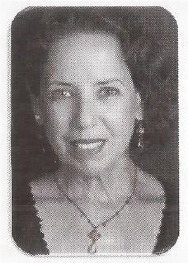 Frankie Enos (see program photo to the right) first joined the TAG Ohana in 2000 when she was cast as Mrs. Strang in TAG’s production of “Equus.” When she first arrived, she was seen mostly as just a newcomer on the acting scene, having first acted with Hawaii Pacific University’s production of “Dark Of The Moon,” under the direction of Joyce Maltby. But she would go on be one of TAG’s most significant contributors, serving as a volunteer, a recruiter (it was she who, among many others, brought TAG lighting and sound legend, Thomas Tochiki, to TAG), a board member, became the creator of “Frankie’s Wine Bar,” and also for a period of time served as TAG’s Managing Director. But her most significant contribution was her leading the charge to establish TAG’s tradition of producing an African-American play during the Martin Luther King holiday, which she initiated in 2003, with Leonard Piggee with “Two Trains Running.” The launching of that play would evolve into TAG’s annual tribute to black playwrights, particularly August Wilson. Throughout this tradition, she would come to select, produce, and assist in some way all of the productions up to the time of “Seven Guitars,” and also all of the rest into the future. Of course, not to be overlooked, Frankie would act in numerous TAG plays, a number of which featured Po’okela award-winning performances, and with her directorial debut for “Seven Guitars,” she would go on to add to her already stellar and prodigious TAG resume.
Frankie Enos (see program photo to the right) first joined the TAG Ohana in 2000 when she was cast as Mrs. Strang in TAG’s production of “Equus.” When she first arrived, she was seen mostly as just a newcomer on the acting scene, having first acted with Hawaii Pacific University’s production of “Dark Of The Moon,” under the direction of Joyce Maltby. But she would go on be one of TAG’s most significant contributors, serving as a volunteer, a recruiter (it was she who, among many others, brought TAG lighting and sound legend, Thomas Tochiki, to TAG), a board member, became the creator of “Frankie’s Wine Bar,” and also for a period of time served as TAG’s Managing Director. But her most significant contribution was her leading the charge to establish TAG’s tradition of producing an African-American play during the Martin Luther King holiday, which she initiated in 2003, with Leonard Piggee with “Two Trains Running.” The launching of that play would evolve into TAG’s annual tribute to black playwrights, particularly August Wilson. Throughout this tradition, she would come to select, produce, and assist in some way all of the productions up to the time of “Seven Guitars,” and also all of the rest into the future. Of course, not to be overlooked, Frankie would act in numerous TAG plays, a number of which featured Po’okela award-winning performances, and with her directorial debut for “Seven Guitars,” she would go on to add to her already stellar and prodigious TAG resume.
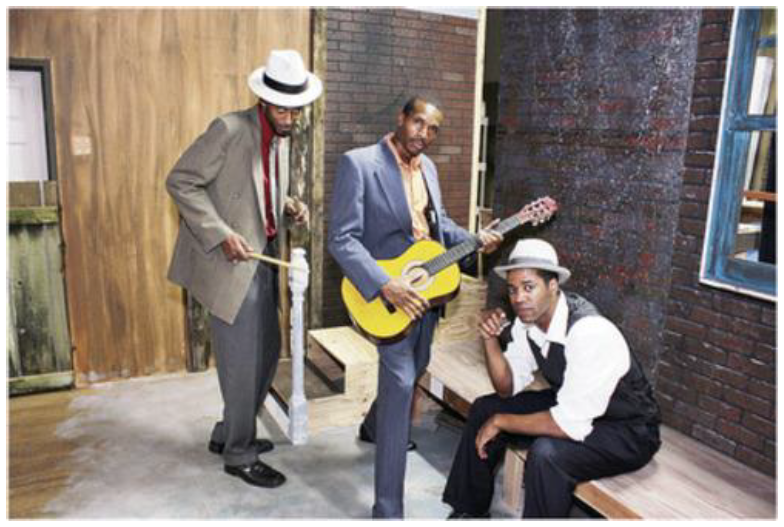 To support Frankie in bringing to life “Seven Guitars” was an ensemble of some of Hawaii’s finest actors. These included (roles are indicated in parentheses): Terry Bookhart (Ruby); Derrick Brown (Hedley); Marc Cooper (Red Carter, left in photo); Reshawn Fields (Vera); Roderick Green (Canewell, right in photo); Lillian M. Jones (Louise); and Khem M. Shepsutera (Floyd Barton, center in photo). In addition, the production benefited from an outstanding crew. These included (roles and responsibilities are indicated in parentheses): James Harber (Assistant Director); Clover Tejada and Mary Ann Shirley Gray (Stage Managers); Andy Alvarado (Set Design and Construction); James Harber (Sound Design and Engineering); Thomas Tochiki (Lighting Design); Libra Forde and Liza Jones (Musical Direction); Dennis Ihara and James Harber (Light and Sound Operators); Carlynn Wolfe and Christine Valles (Costume Design); Greg Howell (Hair and Wig Design); Tony Pisculli (Fight Choreography); Brad Powell (Dance Choreography); Andy Alvarado (Props and Set Dressing); Jason Taglianetti (Photography); and Laurie Tanoura (Production Manager). In her Director’s Notes in the play program, Frankie also gave thanks to: the TAG crew; to Eric Nemoto and (her mentor) Brad Powell for friendship and counsel; to her passionate and exuberant friend, Derrick Brown; to indispensable Clover Tejada, her Eighth Guitar; and to, above all, James Harber, whose advice and support sustained her.
To support Frankie in bringing to life “Seven Guitars” was an ensemble of some of Hawaii’s finest actors. These included (roles are indicated in parentheses): Terry Bookhart (Ruby); Derrick Brown (Hedley); Marc Cooper (Red Carter, left in photo); Reshawn Fields (Vera); Roderick Green (Canewell, right in photo); Lillian M. Jones (Louise); and Khem M. Shepsutera (Floyd Barton, center in photo). In addition, the production benefited from an outstanding crew. These included (roles and responsibilities are indicated in parentheses): James Harber (Assistant Director); Clover Tejada and Mary Ann Shirley Gray (Stage Managers); Andy Alvarado (Set Design and Construction); James Harber (Sound Design and Engineering); Thomas Tochiki (Lighting Design); Libra Forde and Liza Jones (Musical Direction); Dennis Ihara and James Harber (Light and Sound Operators); Carlynn Wolfe and Christine Valles (Costume Design); Greg Howell (Hair and Wig Design); Tony Pisculli (Fight Choreography); Brad Powell (Dance Choreography); Andy Alvarado (Props and Set Dressing); Jason Taglianetti (Photography); and Laurie Tanoura (Production Manager). In her Director’s Notes in the play program, Frankie also gave thanks to: the TAG crew; to Eric Nemoto and (her mentor) Brad Powell for friendship and counsel; to her passionate and exuberant friend, Derrick Brown; to indispensable Clover Tejada, her Eighth Guitar; and to, above all, James Harber, whose advice and support sustained her.
 Seven Guitars, which premiered in 1995 at the Goodman Theatre in Chicago and transferred to Broadway in 1996, is the seventh play in August Wilson’s American Century Cycle, also known as the Pittsburgh Cycle. This series, consisting of ten plays that are each set in a different decade of the 20th century, explore the lives of African Americans during each era. With the exclusion of Ma Rainey’s Black Bottom (1984), which takes place in 1920s Chicago, all the Century Cycle plays are set in the Hill District of Pittsburgh where Wilson was born and raised. The Century Cycle constitutes the majority of Wilson’s work as one of the most significant and influential Black playwrights in United States theatre history. Seven Guitars earned a New York Drama Critics’ Circle Award and nominations for the 1995 Pulitzer and the 1996 Tony Award for Best Play. (supersummary.com) The play is structured within the frame of Floyd “Schoolboy” Barton’s funeral, which opens and closes the drama. The bulk of the story is told as a flashback to a few weeks earlier. Floyd has just returned from serving a 90-day jail sentence he received right after returning to Pittsburgh from Chicago. He has recorded a hit record and wants to take his girlfriend Vera back to Chicago with him. He is held back by his inability to purchase his guitar back from a pawn shop. In a dark scene that foreshadows Floyd’s death, a rooster crows, and Hedley describes to the group of friends in the yard that he sees roosters as similar to black men in Chicago. Then, he gets the rooster and kills it in front of everyone. In Act 2, it is a few days later, and Ruby (the niece of Louise, Vera’s upstairs neighbor) visits with Hedley while he makes chicken sandwiches in the yard. Ruby is in Pittsburgh because she is pregnant. Her boyfriend is in prison for killing another man he thought she was involved with. Hedley sings a song by Buddy Bolden. He reveals that his father told him in a dream that this famous trumpet player would bring him money to buy a plantation. Meanwhile, Floyd has a few unsuccessful attempts to get back his guitar from the pawn shop but is determined to get it back and make it to Chicago. The next evening, Floyd buries something in the yard and shows Vera new things he has purchased. She agrees to marry him and go to Chicago. The group of friends read about a robbery that is later revealed to have been carried out by Floyd. When Hedley sees Floyd with his money, he believes it is Buddy there to give him the money his father promised. When Floyd refuses to hand over the money, Hedley kills him, cutting his throat with a machete. The play closes back at Floyd’s funeral. Those present do not know it is Hedley who killed their friend. (enotes.com)
Seven Guitars, which premiered in 1995 at the Goodman Theatre in Chicago and transferred to Broadway in 1996, is the seventh play in August Wilson’s American Century Cycle, also known as the Pittsburgh Cycle. This series, consisting of ten plays that are each set in a different decade of the 20th century, explore the lives of African Americans during each era. With the exclusion of Ma Rainey’s Black Bottom (1984), which takes place in 1920s Chicago, all the Century Cycle plays are set in the Hill District of Pittsburgh where Wilson was born and raised. The Century Cycle constitutes the majority of Wilson’s work as one of the most significant and influential Black playwrights in United States theatre history. Seven Guitars earned a New York Drama Critics’ Circle Award and nominations for the 1995 Pulitzer and the 1996 Tony Award for Best Play. (supersummary.com) The play is structured within the frame of Floyd “Schoolboy” Barton’s funeral, which opens and closes the drama. The bulk of the story is told as a flashback to a few weeks earlier. Floyd has just returned from serving a 90-day jail sentence he received right after returning to Pittsburgh from Chicago. He has recorded a hit record and wants to take his girlfriend Vera back to Chicago with him. He is held back by his inability to purchase his guitar back from a pawn shop. In a dark scene that foreshadows Floyd’s death, a rooster crows, and Hedley describes to the group of friends in the yard that he sees roosters as similar to black men in Chicago. Then, he gets the rooster and kills it in front of everyone. In Act 2, it is a few days later, and Ruby (the niece of Louise, Vera’s upstairs neighbor) visits with Hedley while he makes chicken sandwiches in the yard. Ruby is in Pittsburgh because she is pregnant. Her boyfriend is in prison for killing another man he thought she was involved with. Hedley sings a song by Buddy Bolden. He reveals that his father told him in a dream that this famous trumpet player would bring him money to buy a plantation. Meanwhile, Floyd has a few unsuccessful attempts to get back his guitar from the pawn shop but is determined to get it back and make it to Chicago. The next evening, Floyd buries something in the yard and shows Vera new things he has purchased. She agrees to marry him and go to Chicago. The group of friends read about a robbery that is later revealed to have been carried out by Floyd. When Hedley sees Floyd with his money, he believes it is Buddy there to give him the money his father promised. When Floyd refuses to hand over the money, Hedley kills him, cutting his throat with a machete. The play closes back at Floyd’s funeral. Those present do not know it is Hedley who killed their friend. (enotes.com)
The Honolulu Star-Advertiser Review For “Seven Guitars”
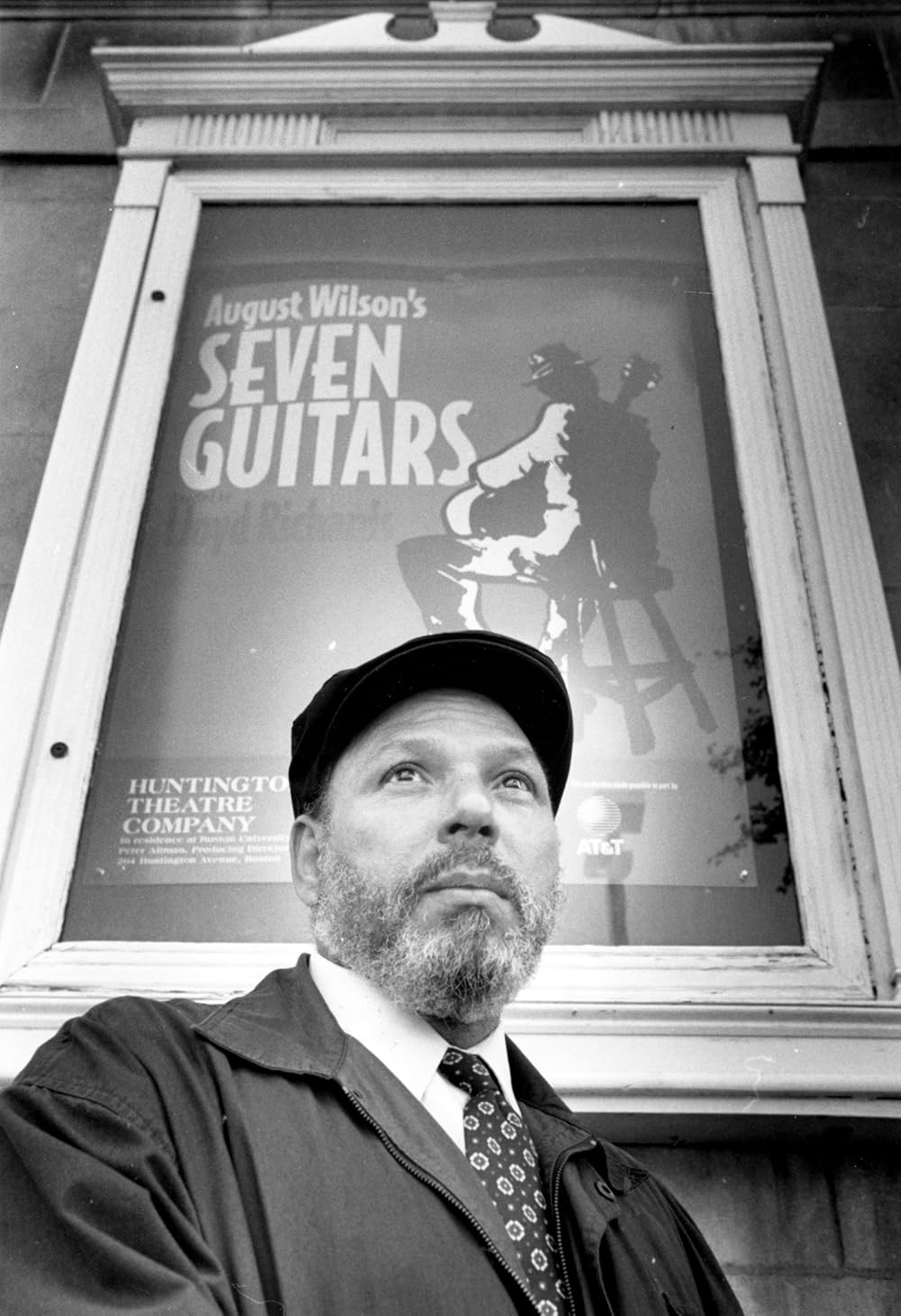 Seven Guitars is the only play in the American Century Cycle that begins with “a note from the playwright.” In it, Wilson explains, “I have tried to extract some measure of truth from [the characters] lives as they struggle to remain whole in the face of so many things that threaten to pull them asunder.” Seven Guitars is chock-full of such “things.” The injustice of the police force, the biased and unfair legal systems in place, insurance ponzi schemes, and institutionalized poverty are all topics of discussion. The characters of Seven Guitars confront these obstacles individually; though two characters stand out to the audience: Floyd, the ambitious protagonist whose first hit single plays consistently on radio throughout the play, and Hedley, a mentally turbulent man who spouts disparate Biblical passages, self-concocted blues lyrics, and allusions to Black leaders of bygone years. Wilson skillfully illustrates the tragic measures these two characters undergo in search for their own fated legacies. Much of the scenes in Seven Guitars are set in the backyard of a Pittsburgh boarding house in 1948. It made its Broadway debut on March 28, 1996, at the Kerr Theatre, and ran for 188 performances. (awaacc.org)
Seven Guitars is the only play in the American Century Cycle that begins with “a note from the playwright.” In it, Wilson explains, “I have tried to extract some measure of truth from [the characters] lives as they struggle to remain whole in the face of so many things that threaten to pull them asunder.” Seven Guitars is chock-full of such “things.” The injustice of the police force, the biased and unfair legal systems in place, insurance ponzi schemes, and institutionalized poverty are all topics of discussion. The characters of Seven Guitars confront these obstacles individually; though two characters stand out to the audience: Floyd, the ambitious protagonist whose first hit single plays consistently on radio throughout the play, and Hedley, a mentally turbulent man who spouts disparate Biblical passages, self-concocted blues lyrics, and allusions to Black leaders of bygone years. Wilson skillfully illustrates the tragic measures these two characters undergo in search for their own fated legacies. Much of the scenes in Seven Guitars are set in the backyard of a Pittsburgh boarding house in 1948. It made its Broadway debut on March 28, 1996, at the Kerr Theatre, and ran for 188 performances. (awaacc.org)
The Promotional Postcard For “Seven Guitars”
“Seven Guitars” had a relatively short run, playing for just 13 performances, which undoubtedly was affected by both other play schedules and the schedules of the actors. It opened on Friday, February 10th, 2012, and closed on Sunday, February 26th, 2012. To fit more shows into the brief, three-week, run, after the opening weekend, where the second show occurred on Saturday, February 11th, at 7:30 p.m., and the following Sunday matinee was at 2:00 p.m. — during the ensuing two weeks after, shows were at 7:30 p.m. on Wednesday through Saturday nights, and at 2:00 p.m. on Sunday matinees. But in spite of the production’s brevity, it proved to be a great success, receiving an abundance of good houses, which replenished TAG’s coffers, and gained critical acclaim. All of this contributed towards earning Frankie Enos a very distinguished effort for her directorial debut, which contributed to the continuance of the August Wilson train of excellent productions.
The Big Grant – So Big We Can’t Even Say
 It’s the irony of all ironies that one of the biggest developments in TAG’s history will have one of the smallest write-ups. Due to the great work of Nancy Moss, who wrote the grant application, TAG would receive approval for a grant that was literally 10 times greater than any other grant that TAG ever received. The condition? TAG is not ever to divulge the name of the benefactor, nor the amount that was received. Hence all that will be said here is that it was received in April of 2012 and it greatly helped TAG with its operational expenses for years to come.
It’s the irony of all ironies that one of the biggest developments in TAG’s history will have one of the smallest write-ups. Due to the great work of Nancy Moss, who wrote the grant application, TAG would receive approval for a grant that was literally 10 times greater than any other grant that TAG ever received. The condition? TAG is not ever to divulge the name of the benefactor, nor the amount that was received. Hence all that will be said here is that it was received in April of 2012 and it greatly helped TAG with its operational expenses for years to come.
The Inspector General – The Great Controversy That Caused TAG’s First Show Cancellation Due To Its Presentation
 TAG’s next play, “The Inspector General,” (originally written as “The Government Inspector”) would prove to be one of its most controversial productions. It would bring into question what standards did TAG hold in terms of what it produces, at its core the issue of what constitutes art in the first place, and where do we draw the line between proper overseeing of a production for quality purposes while at the same time allowing for adequate creative freedom. It began on opening night.
TAG’s next play, “The Inspector General,” (originally written as “The Government Inspector”) would prove to be one of its most controversial productions. It would bring into question what standards did TAG hold in terms of what it produces, at its core the issue of what constitutes art in the first place, and where do we draw the line between proper overseeing of a production for quality purposes while at the same time allowing for adequate creative freedom. It began on opening night.
Hi Eric, and the TAG Board of Directors, I just wanted all of you to know that Ron and I attended “The Inspector General” tonight and I had to leave at intermission, I was so upset and angry. This show is a disaster. From the bad pratfalls, to the jokes about farts and balls, and that the leading male character is being played by a woman in a horrible wig and bad beard. And did I mention the sock puppets??? Yes, sock puppets. What was worse was sitting there with the opening night crowd, many who have been our core supporters for years, watching them sit stone-faced, embarrassed and uncomfortable. How did we let this one get by us?
The email came from TAG Board Member, Rachel Heller, and it went on to question who was the director, and noted that the program notes indicated that there was a kind of “so what, take it or leave it” attitude of the creative team. Rachel’s outcry made the show’s quality become immediately top of mind. Particularly with the just received large grant that TAG received, the concern at the time was what would the grant benefactors think if they ever saw this show. It wouldn’t be so critical if Rachel had not had the respect she had from everyone who dealt with her. But Rachel had been an ardent volunteer for years, a supporter (along with her husband, Ron) of the arts for many theaters, an actor herself, and an eventual novel writer. In the eyes of the TAG board she had street “cred,” and moreover, she had “never” espoused any type of criticism of any TAG play, or for that matter, any play of any other theater, in a public forum before. But in spite of her personal review, and to her credit, Rachel asked the rest of the board to immediately watch the play to assure that she wasn’t completely “off the mark.” The problem, however, was that not everyone was available to take in the show on the following night (Saturday, April 7th, 2012). In particular, TAG Artistic Director, Brad Powell, was on the mainland, and TAG President, Eric Nemoto, was involved in casting with scheduled auditions for a future project. But given that TAG Production Manager, Laurie Tanoura, basically backed up Rachel’s opinion, and TAG volunteer Mary Beth Van Hoogstratten, also did the same, it brought to the forefront the immediate need to either let it go, or make the decision to cancel the entire production altogether. Laurie further pointed out that long-time local director, Glenn Cannon, too, had left after the first act with his wife. So the matter at the moment was a mini-crisis that needed to be decided then. With that in mind, TAG Vice President, Frankie Enos, and Board Members, Suzanne Maloney and Ken Marcus, voted to cancel. Eric Nemoto finally chimed in saying he wasn’t questioning the opinions as to the quality of the show, but also that the spirit of TAG was that it was always about the actors, and so wasn’t in favor of canceling given it wouldn’t show support for the actors who, no matter what they were directed to do, stuck in with the program and so shouldn’t have their opportunities dashed. At the same time, he acknowledged, he hadn’t seen the show, so ultimately couldn’t argue against total cancellation. In the end, a compromise decision would be made. Artistic Director Brad Powell, who was ultimately responsible for the quality of TAG’s productions, would watch the show and make the final decision. He was soon to be en route home, but at best would be able to take in the following day’s scheduled matinee at 2:00 p.m. This decision was communicated by Laurie to Director Enda O. Breadon via a call to his cell phone where she left a voice message, saying that TAG had decided to cancel that night’s (April 7th, 2012) performance and that a decision as to whether the production will continue would be made by Brad the following day. Laurie also informed Joyce (who handled TAG’s reservations) of the decision so that patrons would be notified (there were 14 reservations). Concerned that the cast and crew needed to be told personally about this unprecedented (for TAG to date) decision, Frankie, to her great credit, took it upon herself to go to the theater early to explain the circumstances. Admittedly, she felt if a decision on the future of the play’s run would be based on Brad seeing the show the next day, it didn’t make much sense, in a way, by cancelling Saturday’s show. But the point was that TAG, in that moment, based on numerous indicators, felt that the show should be cut altogether. And so cancelling that night, even if the show would go on for Brad the next day, would at least be limiting the number of shows. Frankie’s decision to meet the cast was a good one. At the time, Enda hadn’t told the cast and crew as yet. He said he didn’t get Laurie’ s message until late in the day, and regardless, he wanted to talk to the cast first. This was understandable. Frankie, admitted that this was all an unhappy business, but she did the best she could, and told everyone that things were on hold until Brad sees the show. She repeatedly said this wasn’t a complaint about the acting. They were doing their best. All in all, it was an extremely tough call, one where TAG felt it would be damned if it did, and damned if they didn’t. Enda was understandably upset and wanted specifics, which Frankie admitted that she didn’t have a lot of (not having seen it), but she suggested that it was the presentation that was the issue. She explained that TAG wasn’t one to shy away from controversial content (she offered the example of “The Goat”), and went over TAG’s mission, which, above all, stressed excellence. While this latter point would always remain a subjective one, enough indicators had already occurred – for example, people commenting on the distaste of what they saw, as well as many leaving before the play concluded – to influence the board that action needed to be taken immediately. To this, the cast readily agreed that about a third of the house had left at intermission during the opening night show. Enda, understandably, had his side of the story. He said that he was assured by Brad all along the way that he (Enda) would be trusted with a rewrite, and he spoke to Laurie every day for the last two weeks where she had seen parts of the show, and moreover, none of the Board Members came to any of the previews. If they did, perhaps these concerns would have been avoided. Of course, the natural response to all of this, in retrospect, was that the Board really doesn’t hold creative control over its productions. Like with any other community theater, the directors of its shows, within reason, are left to their own and to their artistic desires. But did that mean the Board would never intervene? Of course not. The TAG Board, because it represented a theater that was built upon the sweat equity of hundreds who had contributed to it being one of Hawaii’s finest community theaters, was ultimately responsible for everything about the theater, and in this special case felt it had to intervene. Basically, this incident was unprecedented, something TAG had never ever encountered before. Up to that point it had “never” canceled any show due to its quality (shows had always been canceled due to few attendees). No, this was a first. At any rate the Saturday show was indeed canceled. Brad then returned and watched the show the next day and decided that while the show did have its problems, that it would continue. He went over with Enda and the cast a list of things that should be cut, changed, and re-worked, and what needs to be done to speed up the pace of the show. Laurie contributed her thoughts about what she thought of the show and what others had said, and Enda agreed to make most of those changes and that he would work with the cast on implementing them. In fact, he and the cast did and the rest of play dates went on as scheduled.
A Prelude Of Things To Come? The Mock Foreign Currency Of “The Inspector General”
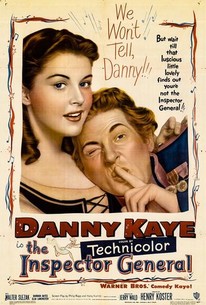 While “The Inspector General,” by Nikolai Gogol, was originally penned nearly 200 years ago and premiered in 1836, many first became familiar with Gogol’s satire through the 1949 movie of the same name starring comedian Danny Kaye. In this farcical Technicolor musical, snake oil salesman Georgi (Kaye) is too honest for his own good. After his partner (Walter Slezak) fires him, the simple-minded Georgi wanders into a corrupt town where he is mistaken for a diplomat. As Georgi unknowingly enjoys his false identity, the townspeople make several botched attempts to assassinate him, believing he is a powerful politician. Matters get even more tangled, and amusing, when the real inspector general shows up. (rottentomatoes.com)
While “The Inspector General,” by Nikolai Gogol, was originally penned nearly 200 years ago and premiered in 1836, many first became familiar with Gogol’s satire through the 1949 movie of the same name starring comedian Danny Kaye. In this farcical Technicolor musical, snake oil salesman Georgi (Kaye) is too honest for his own good. After his partner (Walter Slezak) fires him, the simple-minded Georgi wanders into a corrupt town where he is mistaken for a diplomat. As Georgi unknowingly enjoys his false identity, the townspeople make several botched attempts to assassinate him, believing he is a powerful politician. Matters get even more tangled, and amusing, when the real inspector general shows up. (rottentomatoes.com)
 Adapting The Play: The following are Oison O’Sullivan’s own words as taken from the play program. You might ask, “Why adapt it if it’s already a classic?” You might ask, “Why sock puppets?” You might ask, “Why so much cross-gender casting?” You might ask, “Where do babies come from?” The truth is I really don’t know the answers to any of those questions, although I have seen a video that I think has something to do with that last one. All I can answer is: f you think the play is funny, OK, it’s funny. If you think the play stinks, OK, it stinks. If you think the baby stinks, change the diaper you lazy bastard. Oh, and l do appreciate you paying for a ticket. (playwright notes) He wrote the adaptation. He recently finished his first novel. He hopes to read another one soon. (about the playwright)
Adapting The Play: The following are Oison O’Sullivan’s own words as taken from the play program. You might ask, “Why adapt it if it’s already a classic?” You might ask, “Why sock puppets?” You might ask, “Why so much cross-gender casting?” You might ask, “Where do babies come from?” The truth is I really don’t know the answers to any of those questions, although I have seen a video that I think has something to do with that last one. All I can answer is: f you think the play is funny, OK, it’s funny. If you think the play stinks, OK, it stinks. If you think the baby stinks, change the diaper you lazy bastard. Oh, and l do appreciate you paying for a ticket. (playwright notes) He wrote the adaptation. He recently finished his first novel. He hopes to read another one soon. (about the playwright)
The Director: 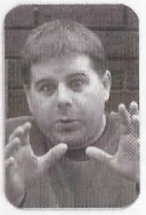 “The Inspector General” was Enda O. Breadon’s first show with TAG. His previous show was with “The New Sense-sational Show” at the Honolulu Theatre for Youth (HTY), which he indicated in the play program was also a collaboration with Oisin O’Sullivan. He had first come to Hawaii to work as a directing intern under then-HTY Artistic Director, Mark Lutwak. His theatrical journey as a director, movement coach, and actor have brought him to many nationally and internationally prominent theatres like Trinity College (Dublin, Ireland), Old Globe (San Diego), Alliance Theatre (Atlanta), Kennedy Center (Washington, D.C.) the Seattle Children’s Theatre, the Nashville Children’s Theatre and more. But, as he professed to the reader (again in the play program), no one should really be impressed, at places like these he was usually at the very bottom of the totem pole. He served for three years as the Education Director for Georgia Ensemble Theatre (GET), a regional theatre in Atlanta. At GET he ran the Conservatory for young actors and directed a number of shows, including the world premiere of “A Short Wordless Play Involving a Banana.” In addition to the “big” places he’s worked, he’s just as proud – or maybe more proud – of the many fringe productions he’s been a part of throughout the country. At the time of the play, he was living in Makiki (a section of Honolulu) with the best dog in the whole world and a wife that was even better than the dog. With respect to “The Inspector General,” Enda further offered the following in his Director’s Notes. “Do not be afraid of greatness, some have greatness thrust upon’em.” – William Shakespeare, Twelfth Night, Act II, Scene V. “But most of us are just mediocre shmucks our whole lives.” – Something Shakespeare should have said. I directed the play. I can prove it: I’m writing the director’s notes. However, that does not in any way make me interesting. As the director, I’d like to draw your attention to the minutiae of my life. It’s pretty freaking boring to be honest. And if I don’t care about it, why would l want to share it on Facebook or Twitter with a few hundred “friends” who also don’t care? And yet, I’m no different than all those other people seeking validation for their existence by tweeting about being stuck in traffic, posting a cute picture of my kid, outraged by the latest high profile court case, announcing the loss of 3 pounds, declaring my love for “you guys and all you do for me,” etc. People look like idiots when they try hard to be important, or even just to look important. Even if they succeed, they look stupid at worst and pompous at best. There’s no difference between the “important” and the lowly. We are all mired in the mundane. Even the president brushes his teeth every morning. And yet some are so desperate to prove their own worth that they think ambition is an asset. And I’m just as guilty as anyone else. We embarrass ourselves trying to be “somebody.” I find that very funny.
“The Inspector General” was Enda O. Breadon’s first show with TAG. His previous show was with “The New Sense-sational Show” at the Honolulu Theatre for Youth (HTY), which he indicated in the play program was also a collaboration with Oisin O’Sullivan. He had first come to Hawaii to work as a directing intern under then-HTY Artistic Director, Mark Lutwak. His theatrical journey as a director, movement coach, and actor have brought him to many nationally and internationally prominent theatres like Trinity College (Dublin, Ireland), Old Globe (San Diego), Alliance Theatre (Atlanta), Kennedy Center (Washington, D.C.) the Seattle Children’s Theatre, the Nashville Children’s Theatre and more. But, as he professed to the reader (again in the play program), no one should really be impressed, at places like these he was usually at the very bottom of the totem pole. He served for three years as the Education Director for Georgia Ensemble Theatre (GET), a regional theatre in Atlanta. At GET he ran the Conservatory for young actors and directed a number of shows, including the world premiere of “A Short Wordless Play Involving a Banana.” In addition to the “big” places he’s worked, he’s just as proud – or maybe more proud – of the many fringe productions he’s been a part of throughout the country. At the time of the play, he was living in Makiki (a section of Honolulu) with the best dog in the whole world and a wife that was even better than the dog. With respect to “The Inspector General,” Enda further offered the following in his Director’s Notes. “Do not be afraid of greatness, some have greatness thrust upon’em.” – William Shakespeare, Twelfth Night, Act II, Scene V. “But most of us are just mediocre shmucks our whole lives.” – Something Shakespeare should have said. I directed the play. I can prove it: I’m writing the director’s notes. However, that does not in any way make me interesting. As the director, I’d like to draw your attention to the minutiae of my life. It’s pretty freaking boring to be honest. And if I don’t care about it, why would l want to share it on Facebook or Twitter with a few hundred “friends” who also don’t care? And yet, I’m no different than all those other people seeking validation for their existence by tweeting about being stuck in traffic, posting a cute picture of my kid, outraged by the latest high profile court case, announcing the loss of 3 pounds, declaring my love for “you guys and all you do for me,” etc. People look like idiots when they try hard to be important, or even just to look important. Even if they succeed, they look stupid at worst and pompous at best. There’s no difference between the “important” and the lowly. We are all mired in the mundane. Even the president brushes his teeth every morning. And yet some are so desperate to prove their own worth that they think ambition is an asset. And I’m just as guilty as anyone else. We embarrass ourselves trying to be “somebody.” I find that very funny.
The Playbill For “The Inspector General”
 The corrupt officials of a small Russian town, headed by the Mayor, react with panic to the news that an incognito inspector will soon be arriving in their town to investigate them. The flurry of activity to cover up their considerable misdeeds is interrupted by the report that a suspicious person had arrived two weeks previously from Saint Petersburg and is staying at the inn. That person, however, is not an inspector; it is Ivan Alexandreyevich Khlestakov (Hlestakov in some translations) a foppish civil servant with a wild imagination. They learn that Khlestakov has not been paying for the hotel, just charging to the bill. Moreover, his original travel destination was Saratov Governorate, but for some unknown reason he has been staying in this town for a long time. Therefore, the Mayor and his crooked cronies are immediately certain that this upper-class twit is the dreaded inspector. For quite some time, however, Khlestakov does not even realize that he has been mistaken for someone else. Meanwhile, he enjoys the officials’ terrified deference and moves in as a guest in the Mayor’s house. He also demands and receives massive “loans” from the Mayor and all of his associates. He also flirts outrageously with the Mayor’s wife and daughter. Sick and tired of the Mayor’s ludicrous demands for bribes, the town’s Jewish and Old Believer merchants arrive, begging Khlestakov to have him dismissed from his post. Stunned at the Mayor’s rapacious corruption, Khlestakov states that he deserves to be exiled in chains to Siberia. Nevertheless, he still requests more “loans” from the merchants, promising to comply with their request. Terrified that he is now undone, the Mayor pleads with Khlestakov not to have him arrested, only to learn that the latter has become engaged to his daughter. Khlestakov then announces that he is returning to Saint Petersburg, having been persuaded by his valet Osip that it is too dangerous to continue the charade any longer. After Khlestakov and Osip depart on a coach driven by the village’s fastest horses, the Mayor’s friends all arrive to congratulate him. Certain that he now has the upper hand, he summons the merchants, boasting of his daughter’s engagement and vowing to squeeze them for every kopeck they are worth. However, the Postmaster suddenly arrives carrying an intercepted letter which reveals Khlestakov’s true identity – and his mocking opinion of them all. The Mayor, after years of bamboozling governors and shaking down criminals of every description, is enraged to have been this humiliated. He screams at his cronies, stating that they, not himself, are to blame. At this moment, the famous fourth-wall breaking phrase is uttered by the Mayor to the audience: “What are you laughing about? You are laughing about yourselves!“. While the cronies continue arguing, a message arrives from the real Government Inspector, who is demanding to see the Mayor immediately. (https://en.wikipedia.org/wiki/The_Government_Inspector)
The corrupt officials of a small Russian town, headed by the Mayor, react with panic to the news that an incognito inspector will soon be arriving in their town to investigate them. The flurry of activity to cover up their considerable misdeeds is interrupted by the report that a suspicious person had arrived two weeks previously from Saint Petersburg and is staying at the inn. That person, however, is not an inspector; it is Ivan Alexandreyevich Khlestakov (Hlestakov in some translations) a foppish civil servant with a wild imagination. They learn that Khlestakov has not been paying for the hotel, just charging to the bill. Moreover, his original travel destination was Saratov Governorate, but for some unknown reason he has been staying in this town for a long time. Therefore, the Mayor and his crooked cronies are immediately certain that this upper-class twit is the dreaded inspector. For quite some time, however, Khlestakov does not even realize that he has been mistaken for someone else. Meanwhile, he enjoys the officials’ terrified deference and moves in as a guest in the Mayor’s house. He also demands and receives massive “loans” from the Mayor and all of his associates. He also flirts outrageously with the Mayor’s wife and daughter. Sick and tired of the Mayor’s ludicrous demands for bribes, the town’s Jewish and Old Believer merchants arrive, begging Khlestakov to have him dismissed from his post. Stunned at the Mayor’s rapacious corruption, Khlestakov states that he deserves to be exiled in chains to Siberia. Nevertheless, he still requests more “loans” from the merchants, promising to comply with their request. Terrified that he is now undone, the Mayor pleads with Khlestakov not to have him arrested, only to learn that the latter has become engaged to his daughter. Khlestakov then announces that he is returning to Saint Petersburg, having been persuaded by his valet Osip that it is too dangerous to continue the charade any longer. After Khlestakov and Osip depart on a coach driven by the village’s fastest horses, the Mayor’s friends all arrive to congratulate him. Certain that he now has the upper hand, he summons the merchants, boasting of his daughter’s engagement and vowing to squeeze them for every kopeck they are worth. However, the Postmaster suddenly arrives carrying an intercepted letter which reveals Khlestakov’s true identity – and his mocking opinion of them all. The Mayor, after years of bamboozling governors and shaking down criminals of every description, is enraged to have been this humiliated. He screams at his cronies, stating that they, not himself, are to blame. At this moment, the famous fourth-wall breaking phrase is uttered by the Mayor to the audience: “What are you laughing about? You are laughing about yourselves!“. While the cronies continue arguing, a message arrives from the real Government Inspector, who is demanding to see the Mayor immediately. (https://en.wikipedia.org/wiki/The_Government_Inspector)
Amidst all the controversy was a talented, beleaguered, but ultimately dedicated cast who toughed it all out. These included (roles are in parentheses): Bettina Adragna (Dobchinsky); Ailia Hopkins (Marya); Joshua Howard Behn (Khlestakov); Michael Brown Bick (Luka, Locksmith’s Wife); Demetrius Jones (Ammos, Svistinov, Officer’s Widow); Rick Murakami (Artemy, Servant, Svistinov); Michele Van Hessen (Anna); and Su Yates (The Governor). Regardless of what the end product was, these artists were greatly appreciated for their work.
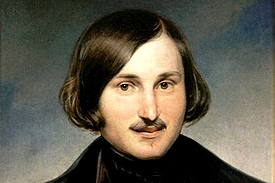 Nikolay Vasilievich Gogol was born in Sorochyntsi, a Ukrainian Cossack village in what is now Ukraine’s Poltava Oblast. His family were from the lower ranks of the gentry, his mother of Polish descent and his father a Ukrainian Cossack who wrote poetry and drama in Ukrainian. The family spoke both Ukrainian and Russian at home, and Gogol would later make a conscious choice to pursue a literary career in Russian rather than Ukrainian. He was educated at the Gymnasium of Higher Sciences in Nezhyn, a school founded as part of Alexander I’s education reforms. On leaving school in 1828, he moved to St. Petersburg with high ambitions of becoming a famous writer. He had with him a long Romantic poem of German rural life called Hans Küchelgarten, which he had published at his own expense and sent copies of to the leading literary journals. The work was rejected and derided by all, and Gogol bought up and burnt all the copies, swearing never to write poetry again. He turned instead to prose, producing a series of tales set in the Ukrainian countryside, mostly comic, sentimental and occasionally macabre. These met with instant success, and were published in two volumes under the title Evenings on a Farm Near Dikanka in 1831 and 1832. Gogol’s work was strongly supported by the leading lights of the St. Petersburg literary scene, including Vasiliy Zhukovsky and Pyotr Pletnyov, and even Alexander Pushkin, who he met in 1831 and formed a frienship with. His Ukrainian pastoral period continued with the two volumes of Mirgorod, published in 1835, but in the same year he also published the collection Arabesques, which contained stories set in St. Petersburg and included the classic Nevsky Prospekt and Diary of a Madman. These stories began to explore the themes of alienation and mental instability, set against the fripperies of fashionable life and the Byzantine inhumanity of the state’s bureaucracy, that he would further develop in his most famous stories, The Nose (1836) and The Overcoat (1842). It was also in 1835 that he completed his first comedy for the stage, Marriage, although it was not published or performed until 1842. The Government Inspector, his most famous play, was premiered in 1836 after receiving the official approval of Nicholas I. A biting satire on the corruption and incompetence of provincial government, it was interpreted by many as an attack on the whole system of Tsarist rule, much to Gogol’s consternation as he was in fact an ultraconservative monarchist. Although he had achieved the literary success that he craved, and was equally admired by critics and general readers, Gogol had not found much personal happiness. He had developed an entirely amateur passion for history, and attempted to gain an appointment at the University of Kyiv, despite being utterly lacking in qualifications. His literary fame allowed him to win the professorship of medieval history at St. Petersburg University in 1834, but his lack of knowledge made him completely incapable of performing the work, and he resigned after only a year of farcical subterfuge and failure. Gogol left Russia in 1836 and spent most of the next twelve years abroad, travelling in France, Germany and Switzerland, and eventually settling in Rome. There he studied art, became a committed opera lover, and supposedly fell in love in 1838 with Count Joseph Vielhorskiy, the 23-year-old son of a prominent Russian official who had come to Italy in an attempt to cure his tuberculosis. He died there the following year. All this time, Gogol continued to work his masterpiece, the satirical novel Dead Souls. He completed it in 1841 and returned to Russia to oversee its publication. It appeared the following year and was an enormous success, further cementing Gogol’s position as one of Russia’s best-loved authors. Once again, however, Gogol was shocked and upset at the way his work was seen as a satirical attack on the whole Tsarist system. In fact, Gogol planned for Dead Souls to be the first part of a trilogy that would see his roguish protagonist Chichikov gradually reformed and spiritually purified. His increasingly religious disposition and his terror of demonic forces prompted him to make a pilgrimage to Jerusalem in 1846-1847, and in 1848 he returned to Russia to complete the second volume of his work. Dissatisfied with his writings, he fell further under the influence of the spiritual elder Matvey Konstantinovsky, who tried to convince him that writing fiction was a demonic and sinful activity. Gogol became increasingly ascetic, and suffered severe bouts of depression. During one of these on 24 February 1852, he burned most of the manuscripts of the second volume of Dead Souls. In despair at what he had done, believing himself to have been tricked by the Devil himself, Gogol took to his bed and refused all food, and died in agony nine days later. He was buried at the Danilov Monastery in Moscow. In the 1930s his grave was transferred to the Novodevichy Cemetery, during which process it was discovered that he was lying face down in his coffin, giving rise to the rumour that he had been buried alive. In St. Petersburg, Gogol is commemorated with an imposing and somewhat mournful statue on pedestrian Malay Konyushennaya Ulitsa just off Nevsky Prospekt. (saint-petersburg.com)
Nikolay Vasilievich Gogol was born in Sorochyntsi, a Ukrainian Cossack village in what is now Ukraine’s Poltava Oblast. His family were from the lower ranks of the gentry, his mother of Polish descent and his father a Ukrainian Cossack who wrote poetry and drama in Ukrainian. The family spoke both Ukrainian and Russian at home, and Gogol would later make a conscious choice to pursue a literary career in Russian rather than Ukrainian. He was educated at the Gymnasium of Higher Sciences in Nezhyn, a school founded as part of Alexander I’s education reforms. On leaving school in 1828, he moved to St. Petersburg with high ambitions of becoming a famous writer. He had with him a long Romantic poem of German rural life called Hans Küchelgarten, which he had published at his own expense and sent copies of to the leading literary journals. The work was rejected and derided by all, and Gogol bought up and burnt all the copies, swearing never to write poetry again. He turned instead to prose, producing a series of tales set in the Ukrainian countryside, mostly comic, sentimental and occasionally macabre. These met with instant success, and were published in two volumes under the title Evenings on a Farm Near Dikanka in 1831 and 1832. Gogol’s work was strongly supported by the leading lights of the St. Petersburg literary scene, including Vasiliy Zhukovsky and Pyotr Pletnyov, and even Alexander Pushkin, who he met in 1831 and formed a frienship with. His Ukrainian pastoral period continued with the two volumes of Mirgorod, published in 1835, but in the same year he also published the collection Arabesques, which contained stories set in St. Petersburg and included the classic Nevsky Prospekt and Diary of a Madman. These stories began to explore the themes of alienation and mental instability, set against the fripperies of fashionable life and the Byzantine inhumanity of the state’s bureaucracy, that he would further develop in his most famous stories, The Nose (1836) and The Overcoat (1842). It was also in 1835 that he completed his first comedy for the stage, Marriage, although it was not published or performed until 1842. The Government Inspector, his most famous play, was premiered in 1836 after receiving the official approval of Nicholas I. A biting satire on the corruption and incompetence of provincial government, it was interpreted by many as an attack on the whole system of Tsarist rule, much to Gogol’s consternation as he was in fact an ultraconservative monarchist. Although he had achieved the literary success that he craved, and was equally admired by critics and general readers, Gogol had not found much personal happiness. He had developed an entirely amateur passion for history, and attempted to gain an appointment at the University of Kyiv, despite being utterly lacking in qualifications. His literary fame allowed him to win the professorship of medieval history at St. Petersburg University in 1834, but his lack of knowledge made him completely incapable of performing the work, and he resigned after only a year of farcical subterfuge and failure. Gogol left Russia in 1836 and spent most of the next twelve years abroad, travelling in France, Germany and Switzerland, and eventually settling in Rome. There he studied art, became a committed opera lover, and supposedly fell in love in 1838 with Count Joseph Vielhorskiy, the 23-year-old son of a prominent Russian official who had come to Italy in an attempt to cure his tuberculosis. He died there the following year. All this time, Gogol continued to work his masterpiece, the satirical novel Dead Souls. He completed it in 1841 and returned to Russia to oversee its publication. It appeared the following year and was an enormous success, further cementing Gogol’s position as one of Russia’s best-loved authors. Once again, however, Gogol was shocked and upset at the way his work was seen as a satirical attack on the whole Tsarist system. In fact, Gogol planned for Dead Souls to be the first part of a trilogy that would see his roguish protagonist Chichikov gradually reformed and spiritually purified. His increasingly religious disposition and his terror of demonic forces prompted him to make a pilgrimage to Jerusalem in 1846-1847, and in 1848 he returned to Russia to complete the second volume of his work. Dissatisfied with his writings, he fell further under the influence of the spiritual elder Matvey Konstantinovsky, who tried to convince him that writing fiction was a demonic and sinful activity. Gogol became increasingly ascetic, and suffered severe bouts of depression. During one of these on 24 February 1852, he burned most of the manuscripts of the second volume of Dead Souls. In despair at what he had done, believing himself to have been tricked by the Devil himself, Gogol took to his bed and refused all food, and died in agony nine days later. He was buried at the Danilov Monastery in Moscow. In the 1930s his grave was transferred to the Novodevichy Cemetery, during which process it was discovered that he was lying face down in his coffin, giving rise to the rumour that he had been buried alive. In St. Petersburg, Gogol is commemorated with an imposing and somewhat mournful statue on pedestrian Malay Konyushennaya Ulitsa just off Nevsky Prospekt. (saint-petersburg.com)
“The Inspector General,” regardless of its embattled production, benefited from a talented and devoted crew. To support Director Breadon were (roles and responsibilities are in parentheses): Lanaly Cabalo (Stage Manager); Nicole DesLauriers (Puppet Master); Andy Alvarado (Set Design and Construction); Endo O. Breadon (Sound Design); Thomas Tochiki (Light Design); Andrea Valencia (Light and Sound Operator); Carlynn Wolfe and Christine Valles (Costume Design); Andy Alvarado (Props and Set Dressing); Loren K. D. Farmer (Photography); and Laurie Tanoura (Production Manager).
The Honolulu Star-Advertiser Review Of “The Inspector General”
The Inspector General was successfully staged over 14 performances. It opened on Friday, April 6th, 2012. As described, the ensuing Saturday, April 7th, 2012 show was canceled. The next day’s matinee, held on Sunday, April 8th, 2012 at 2:00 p.m., played as scheduled. All of the remaining performance dates were honored. Thursday through Saturday night shows were at 7:30 p.m., and, again, Sunday matinees began at 2:00 p.m. The production closed on Sunday, April 29th, 2012.
The Postcard For “The Inspector General”
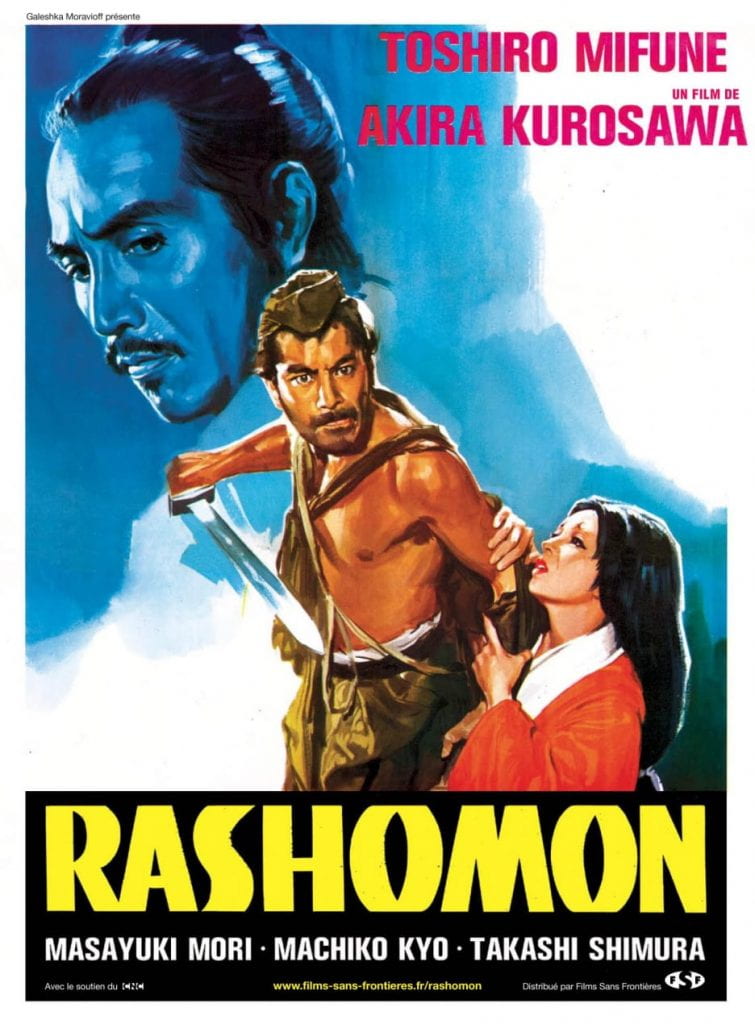 With the benefit of hindsight, while it was certainly an unpleasant development, the cancellation of one performance of “The Inspector General,” and the subsequent call to let the production continue thereafter with changes, were likely the best decisions for all parties involved. No, it wasn’t TAG’s policy to take over a production. But the myriad of comments and audience walk outs pretty much confirmed that what was displayed on opening night went beyond mere creative license. Certainly a likely contributor to the Board’s consternation was the fact that it had just received the largest grant in its history and the concern that was prevalent was what would happen if any of its new benefactors were to see what TAG had just opened. Yes, looking at the promotional material for the play, it did provide a warning that bawdy and adult humor was to be provided, but even so, the negative reaction seemed to go well beyond just a personal dislike for the play. “Embarrassed,” “Insulted,” “Disgusted,” were comments that did not go with persons who just felt the play ‘wasn’t their cup of tea.’ In fact, some of the moments that audience members found objectionable were: a couple of scenes where it looked like the mother and the Inspector were copulating – she with her (rather large) backside to the audience bouncing up and down; when the inspector came out at one point and his pants were wet in the front, and he says, “I seem to have had a fine snooze, (looking at his crotch) I even perspired. After the meal yesterday they must have slipped something into me that knocked me out. I still feel a pounding in my . . . head.” (i.e. feigning the pounding was in his crotch); and in relation to the “Short, Wordless Play involving a Banana,” by Thomas Jenkins – towards the end of the piece, the actor comes out looking pregnant and then drops a fake baby attached to an umbilical cord onto the floor. Art, as they say, is often in the eyes of the beholder. So it wasn’t in relation to any one thing. But somehow, the “presentation,” as Frankie had alluded to in her meeting with the cast, was something that many found unsatisfying to say the least. But after the changes made by Brad, the production went on to enjoy a, if not outstanding, at least a decent, appreciative run. Through it all, however painful it might have been at the onset, there were kudos to go around. To Rachel Heller, for pointing out publicly what others might have just shrugged off. To the TAG Board who took decisive action. It would have been easier to not take action, but those who felt something should be done made the right call. To Frankie Enos who took on the unenviable task of talking to Enda and the cast. To Brad Powell for watching the show and offering up his comments when he had returned from being away for a while on the mainland. To Laurie Tanoura, who was the point person on everything involving the production (in effect, it’s easy to point things out, not easy to work with the cast and crew afterwards). To Enda O. Breadon for listening and making the changes that Brad suggested. And above all, to the cast and crew who diligently stayed with the production despite the complaints and changes. In the end, displaying the irony of it all, was that “The Inspector General,” what with all the controversy, ended up being selected for a Best Play Po’okela at the following year’s HSTC awards. How could this be? One could only surmise. Did the implementation of Brad’s changes cause a better play? Were the majority of the “bawdiness” still intact and were actually appreciated? Was the award a reflection of the play’s “quality” or rather a commentary of the Po’okela evaluation process? It would be revealed later that the process that year was that each of the three adjudicators were allowed to pick one stage production for best play and so these were automatically given a Po’okela. The answers to these curious questions have been lost to time. But even so, perhaps the answers lie somewhere in the mystery that truth is often times based on one’s point of view. Maybe it is like that great Akira Kurosawa classic film, “Rashomon,” (poster appears top right) which recounts the different versions of four people who tell their story of a man’s murder and the rape of his wife. “Rashomon” incisively examines the nature of truth, which in the end can be elusive at best. In retrospect, perhaps truth really isn’t important at all. Years later, when pondering the incident that the great majority of people have all gotten over, we realize that what really is important about “The Inspector General,” is that it involved a lot of good people all doing what they thought was in the best interests of TAG.
With the benefit of hindsight, while it was certainly an unpleasant development, the cancellation of one performance of “The Inspector General,” and the subsequent call to let the production continue thereafter with changes, were likely the best decisions for all parties involved. No, it wasn’t TAG’s policy to take over a production. But the myriad of comments and audience walk outs pretty much confirmed that what was displayed on opening night went beyond mere creative license. Certainly a likely contributor to the Board’s consternation was the fact that it had just received the largest grant in its history and the concern that was prevalent was what would happen if any of its new benefactors were to see what TAG had just opened. Yes, looking at the promotional material for the play, it did provide a warning that bawdy and adult humor was to be provided, but even so, the negative reaction seemed to go well beyond just a personal dislike for the play. “Embarrassed,” “Insulted,” “Disgusted,” were comments that did not go with persons who just felt the play ‘wasn’t their cup of tea.’ In fact, some of the moments that audience members found objectionable were: a couple of scenes where it looked like the mother and the Inspector were copulating – she with her (rather large) backside to the audience bouncing up and down; when the inspector came out at one point and his pants were wet in the front, and he says, “I seem to have had a fine snooze, (looking at his crotch) I even perspired. After the meal yesterday they must have slipped something into me that knocked me out. I still feel a pounding in my . . . head.” (i.e. feigning the pounding was in his crotch); and in relation to the “Short, Wordless Play involving a Banana,” by Thomas Jenkins – towards the end of the piece, the actor comes out looking pregnant and then drops a fake baby attached to an umbilical cord onto the floor. Art, as they say, is often in the eyes of the beholder. So it wasn’t in relation to any one thing. But somehow, the “presentation,” as Frankie had alluded to in her meeting with the cast, was something that many found unsatisfying to say the least. But after the changes made by Brad, the production went on to enjoy a, if not outstanding, at least a decent, appreciative run. Through it all, however painful it might have been at the onset, there were kudos to go around. To Rachel Heller, for pointing out publicly what others might have just shrugged off. To the TAG Board who took decisive action. It would have been easier to not take action, but those who felt something should be done made the right call. To Frankie Enos who took on the unenviable task of talking to Enda and the cast. To Brad Powell for watching the show and offering up his comments when he had returned from being away for a while on the mainland. To Laurie Tanoura, who was the point person on everything involving the production (in effect, it’s easy to point things out, not easy to work with the cast and crew afterwards). To Enda O. Breadon for listening and making the changes that Brad suggested. And above all, to the cast and crew who diligently stayed with the production despite the complaints and changes. In the end, displaying the irony of it all, was that “The Inspector General,” what with all the controversy, ended up being selected for a Best Play Po’okela at the following year’s HSTC awards. How could this be? One could only surmise. Did the implementation of Brad’s changes cause a better play? Were the majority of the “bawdiness” still intact and were actually appreciated? Was the award a reflection of the play’s “quality” or rather a commentary of the Po’okela evaluation process? It would be revealed later that the process that year was that each of the three adjudicators were allowed to pick one stage production for best play and so these were automatically given a Po’okela. The answers to these curious questions have been lost to time. But even so, perhaps the answers lie somewhere in the mystery that truth is often times based on one’s point of view. Maybe it is like that great Akira Kurosawa classic film, “Rashomon,” (poster appears top right) which recounts the different versions of four people who tell their story of a man’s murder and the rape of his wife. “Rashomon” incisively examines the nature of truth, which in the end can be elusive at best. In retrospect, perhaps truth really isn’t important at all. Years later, when pondering the incident that the great majority of people have all gotten over, we realize that what really is important about “The Inspector General,” is that it involved a lot of good people all doing what they thought was in the best interests of TAG.
A Doll’s House – Brad Powell Returns With Ibsen’s Most Famous Play
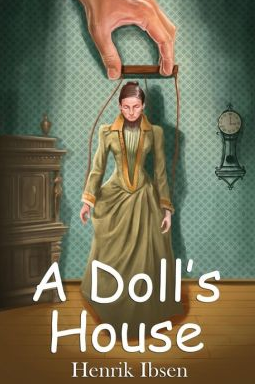 With the success of “Ghosts” during the previous 2010-2011 season, it only seemed natural that TAG’s Artistic Director, Brad Powell, would want to follow it up with what many think is Henrik Ibsen’s most famous play, “A Doll’s House.” His decision to include one of theater’s most popular plays (in 2006 it was “the” most performed play in the entire world per wikipedia.com), was a production that assuredly had many of TAG’s followers eagerly looking forward to seeing, particularly since Brad selected it to be the final play of the 2011-2012 season. Given this decision, it then gave Brad another chance to immerse himself in the Norwegian language and dwell, for a while, in the beautiful country of Norway, which he loved so very much (for a description of his upbringing as it relates to Norway, see the write up for “Ghosts” on the 2010-2011 TAG history page). Once again, Brad had to translate Ibsen’s work, first from Danish to Norwegian, and then from Norwegian to English, a process that, this time, Brad was familiar with doing, but, was likely no less arduous. However, it was certainly a labor of love. In the end, it would become another TAG production that Brad would be very proud of, as in the program’s director’s notes, he concluded by writing, “With ‘A Doll’s House,’ I have been blessed with a wonderful cast of very talented actors. These seven people have been a joy to work with and I hope that you will enjoy their interpretation of Ibsen’s landmark play.”
With the success of “Ghosts” during the previous 2010-2011 season, it only seemed natural that TAG’s Artistic Director, Brad Powell, would want to follow it up with what many think is Henrik Ibsen’s most famous play, “A Doll’s House.” His decision to include one of theater’s most popular plays (in 2006 it was “the” most performed play in the entire world per wikipedia.com), was a production that assuredly had many of TAG’s followers eagerly looking forward to seeing, particularly since Brad selected it to be the final play of the 2011-2012 season. Given this decision, it then gave Brad another chance to immerse himself in the Norwegian language and dwell, for a while, in the beautiful country of Norway, which he loved so very much (for a description of his upbringing as it relates to Norway, see the write up for “Ghosts” on the 2010-2011 TAG history page). Once again, Brad had to translate Ibsen’s work, first from Danish to Norwegian, and then from Norwegian to English, a process that, this time, Brad was familiar with doing, but, was likely no less arduous. However, it was certainly a labor of love. In the end, it would become another TAG production that Brad would be very proud of, as in the program’s director’s notes, he concluded by writing, “With ‘A Doll’s House,’ I have been blessed with a wonderful cast of very talented actors. These seven people have been a joy to work with and I hope that you will enjoy their interpretation of Ibsen’s landmark play.”
The Playbill For “A Doll’s House”
As usual, Brad brought with him an outstanding cast that would help him bring Ibsen’s classic to the Hawaii stage. These included (roles are listed in the parentheses): Anemone Jones (Nora Helmer); Aaron Roberge (Torvald Helmer); Sara Kate Langham (Kristine Linde); David Farmer (Dr. Rank); Tony Nickelsen (Nils Krogstad); and Laurie Tanoura (Anne-Marie).
Aaron Roberge (Torvald), Anemone Jones (Nora), & David Farmer (Dr. Rank)
 A Doll’s House opens on Christmas Eve. Nora Helmer enters her well-furnished living room—the setting of the entire play—carrying several packages. Torvald Helmer, Nora’s husband, comes out of his study when he hears her arrive. He greets her playfully and affectionately, but then chides her for spending so much money on Christmas gifts. Their conversation reveals that the Helmers have had to be careful with money for many years, but that Torvald has recently obtained a new position at the bank where he works that will afford them a more comfortable lifestyle. Helene, the maid, announces that the Helmers’ dear friend Dr. Rank has come to visit. At the same time, another visitor has arrived, this one unknown. To Nora’s great surprise, Kristine Linde, a former school friend, comes into the room. The two have not seen each other for years, but Nora mentions having read that Mrs. Linde’s husband passed away a few years earlier. Mrs. Linde tells Nora that when her husband died, she was left with no money and no children. Nora tells Mrs. Linde about her first year of marriage to Torvald. She explains that they were very poor and both had to work long hours. Torvald became sick, she adds, and the couple had to travel to Italy so that Torvald could recover. Nora inquires further about Mrs. Linde’s life, and Mrs. Linde explains that for years she had to care for her sick mother and her two younger brothers. She states that her mother has passed away, though, and that the brothers are too old to need her. Instead of feeling relief, Mrs. Linde says she feels empty because she has no occupation; she hopes that Torvald may be able to help her obtain employment. Nora promises to speak to Torvald and then reveals a great secret to Mrs. Linde—without Torvald’s knowledge, Nora illegally borrowed money for the trip that she and Torvald took to Italy; she told Torvald that the money had come from her father. For years, Nora reveals, she has worked and saved in secret, slowly repaying the debt, and soon it will be fully repaid. Krogstad, a low-level employee at the bank where Torvald works, arrives and proceeds into Torvald’s study. Nora reacts uneasily to Krogstad’s presence, and Dr. Rank, coming out of the study, says Krogstad is “morally sick.” Once he has finished meeting with Krogstad, Torvald comes into the living room and says that he can probably hire Mrs. Linde at the bank. Dr. Rank, Torvald, and Mrs. Linde then depart, leaving Nora by herself. Nora’s children return with their nanny, Anne-Marie, and Nora plays with them until she notices Krogstad’s presence in the room. The two converse, and Krogstad is revealed to be the source of Nora’s secret loan. Krogstad states that Torvald wants to fire him from his position at the bank and alludes to his own poor reputation. He asks Nora to use her influence to ensure that his position remains secure. When she refuses, Krogstad points out that he has in his possession a contract that contains Nora’s forgery of her father’s signature. Krogstad blackmails Nora, threatening to reveal her crime and to bring shame and disgrace on both Nora and her husband if she does not prevent Torvald from firing him. Krogstad leaves, and when Torvald returns, Nora tries to convince him not to fire Krogstad, but Torvald will hear nothing of it. He declares Krogstad an immoral man and states that he feels physically ill in the presence of such people. Act Two opens on the following day, Christmas. Alone, Nora paces her living room, filled with anxiety. Mrs. Linde arrives and helps sew Nora’s costume for the ball that Nora will be attending at her neighbors’ home the following evening. Nora tells Mrs. Linde that Dr. Rank has a mortal illness that he inherited from his father. Nora’s suspicious behavior leads Mrs. Linde to guess that Dr. Rank is the source of Nora’s loan. Nora denies Mrs. Linde’s charge but refuses to reveal the source of her distress. Torvald arrives, and Nora again begs him to keep Krogstad employed at the bank, but again Torvald refuses. When Nora presses him, he admits that Krogstad’s moral behavior isn’t all that bothers him—he dislikes Krogstad’s overly familiar attitude. Torvald and Nora argue until Torvald sends the maid to deliver Krogstad’s letter of dismissal. Torvald leaves. Dr. Rank arrives and tells Nora that he knows he is close to death. She attempts to cheer him up and begins to flirt with him. She seems to be preparing to ask him to intervene on her behalf in her struggle with Torvald. Suddenly, Dr. Rank reveals to Nora that he is in love with her. In light of this revelation, Nora refuses to ask Dr. Rank for anything. Once Dr. Rank leaves, Krogstad arrives and demands an explanation for his dismissal. He wants respectability and has changed the terms of the blackmail: he now insists to Nora not only that he be rehired at the bank but that he be rehired in a higher position. He then puts a letter detailing Nora’s debt and forgery in the Helmers’ letterbox. In a panic, Nora tells Mrs. Linde everything, and Mrs. Linde instructs Nora to delay Torvald from opening the letter as long as possible while she goes to speak with Krogstad. In order to distract Torvald from the letterbox, Nora begins to practice the tarantella she will perform at that evening’s costume party. In her agitated emotional state, she dances wildly and violently, displeasing Torvald. Nora manages to make Torvald promise not to open his mail until after she performs at the party. Mrs. Linde soon returns and says that she has left Krogstad a note but that he will be gone until the following evening. The next night, as the costume party takes place upstairs, Krogstad meets Mrs. Linde in the Helmers’ living room. Their conversation reveals that the two had once been deeply in love, but Mrs. Linde left Krogstad for a wealthier man who would enable her to support her family. She tells Krogstad that now that she is free of her own familial obligations and wishes to be with Krogstad and care for his children. Krogstad is overjoyed and says he will demand his letter back before Torvald can read it and learn Nora’s secret. Mrs. Linde, however, insists he leave the letter, because she believes both Torvald and Nora will be better off once the truth has been revealed. Soon after Krogstad’s departure, Nora and Torvald enter, back from the costume ball. After saying goodnight to Mrs. Linde, Torvald tells Nora how desirable she looked as she danced. Dr. Rank, who was also at the party and has come to say goodnight, promptly interrupts Torvald’s advances on Nora. After Dr. Rank leaves, Torvald finds in his letterbox two of Dr. Rank’s visiting cards, each with a black cross above the name. Nora knows Dr. Rank’s cards constitute his announcement that he will soon die, and she informs Torvald of this fact. She then insists that Torvald read Krogstad’s letter. Torvald reads the letter and is outraged. He calls Nora a hypocrite and a liar and complains that she has ruined his happiness. He declares that she will not be allowed to raise their children. Helene then brings in a letter. Torvald opens it and discovers that Krogstad has returned Nora’s contract (which contains the forged signature). Overjoyed, Torvald attempts to dismiss his past insults, but his harsh words have triggered something in Nora. She declares that despite their eight years of marriage, they do not understand one another. Torvald, Nora asserts, has treated her like a “doll” to be played with and admired. She decides to leave Torvald, declaring that she must “make sense of [her]self and everything around her.” She walks out, slamming the door behind her. (sparknotes.com)
A Doll’s House opens on Christmas Eve. Nora Helmer enters her well-furnished living room—the setting of the entire play—carrying several packages. Torvald Helmer, Nora’s husband, comes out of his study when he hears her arrive. He greets her playfully and affectionately, but then chides her for spending so much money on Christmas gifts. Their conversation reveals that the Helmers have had to be careful with money for many years, but that Torvald has recently obtained a new position at the bank where he works that will afford them a more comfortable lifestyle. Helene, the maid, announces that the Helmers’ dear friend Dr. Rank has come to visit. At the same time, another visitor has arrived, this one unknown. To Nora’s great surprise, Kristine Linde, a former school friend, comes into the room. The two have not seen each other for years, but Nora mentions having read that Mrs. Linde’s husband passed away a few years earlier. Mrs. Linde tells Nora that when her husband died, she was left with no money and no children. Nora tells Mrs. Linde about her first year of marriage to Torvald. She explains that they were very poor and both had to work long hours. Torvald became sick, she adds, and the couple had to travel to Italy so that Torvald could recover. Nora inquires further about Mrs. Linde’s life, and Mrs. Linde explains that for years she had to care for her sick mother and her two younger brothers. She states that her mother has passed away, though, and that the brothers are too old to need her. Instead of feeling relief, Mrs. Linde says she feels empty because she has no occupation; she hopes that Torvald may be able to help her obtain employment. Nora promises to speak to Torvald and then reveals a great secret to Mrs. Linde—without Torvald’s knowledge, Nora illegally borrowed money for the trip that she and Torvald took to Italy; she told Torvald that the money had come from her father. For years, Nora reveals, she has worked and saved in secret, slowly repaying the debt, and soon it will be fully repaid. Krogstad, a low-level employee at the bank where Torvald works, arrives and proceeds into Torvald’s study. Nora reacts uneasily to Krogstad’s presence, and Dr. Rank, coming out of the study, says Krogstad is “morally sick.” Once he has finished meeting with Krogstad, Torvald comes into the living room and says that he can probably hire Mrs. Linde at the bank. Dr. Rank, Torvald, and Mrs. Linde then depart, leaving Nora by herself. Nora’s children return with their nanny, Anne-Marie, and Nora plays with them until she notices Krogstad’s presence in the room. The two converse, and Krogstad is revealed to be the source of Nora’s secret loan. Krogstad states that Torvald wants to fire him from his position at the bank and alludes to his own poor reputation. He asks Nora to use her influence to ensure that his position remains secure. When she refuses, Krogstad points out that he has in his possession a contract that contains Nora’s forgery of her father’s signature. Krogstad blackmails Nora, threatening to reveal her crime and to bring shame and disgrace on both Nora and her husband if she does not prevent Torvald from firing him. Krogstad leaves, and when Torvald returns, Nora tries to convince him not to fire Krogstad, but Torvald will hear nothing of it. He declares Krogstad an immoral man and states that he feels physically ill in the presence of such people. Act Two opens on the following day, Christmas. Alone, Nora paces her living room, filled with anxiety. Mrs. Linde arrives and helps sew Nora’s costume for the ball that Nora will be attending at her neighbors’ home the following evening. Nora tells Mrs. Linde that Dr. Rank has a mortal illness that he inherited from his father. Nora’s suspicious behavior leads Mrs. Linde to guess that Dr. Rank is the source of Nora’s loan. Nora denies Mrs. Linde’s charge but refuses to reveal the source of her distress. Torvald arrives, and Nora again begs him to keep Krogstad employed at the bank, but again Torvald refuses. When Nora presses him, he admits that Krogstad’s moral behavior isn’t all that bothers him—he dislikes Krogstad’s overly familiar attitude. Torvald and Nora argue until Torvald sends the maid to deliver Krogstad’s letter of dismissal. Torvald leaves. Dr. Rank arrives and tells Nora that he knows he is close to death. She attempts to cheer him up and begins to flirt with him. She seems to be preparing to ask him to intervene on her behalf in her struggle with Torvald. Suddenly, Dr. Rank reveals to Nora that he is in love with her. In light of this revelation, Nora refuses to ask Dr. Rank for anything. Once Dr. Rank leaves, Krogstad arrives and demands an explanation for his dismissal. He wants respectability and has changed the terms of the blackmail: he now insists to Nora not only that he be rehired at the bank but that he be rehired in a higher position. He then puts a letter detailing Nora’s debt and forgery in the Helmers’ letterbox. In a panic, Nora tells Mrs. Linde everything, and Mrs. Linde instructs Nora to delay Torvald from opening the letter as long as possible while she goes to speak with Krogstad. In order to distract Torvald from the letterbox, Nora begins to practice the tarantella she will perform at that evening’s costume party. In her agitated emotional state, she dances wildly and violently, displeasing Torvald. Nora manages to make Torvald promise not to open his mail until after she performs at the party. Mrs. Linde soon returns and says that she has left Krogstad a note but that he will be gone until the following evening. The next night, as the costume party takes place upstairs, Krogstad meets Mrs. Linde in the Helmers’ living room. Their conversation reveals that the two had once been deeply in love, but Mrs. Linde left Krogstad for a wealthier man who would enable her to support her family. She tells Krogstad that now that she is free of her own familial obligations and wishes to be with Krogstad and care for his children. Krogstad is overjoyed and says he will demand his letter back before Torvald can read it and learn Nora’s secret. Mrs. Linde, however, insists he leave the letter, because she believes both Torvald and Nora will be better off once the truth has been revealed. Soon after Krogstad’s departure, Nora and Torvald enter, back from the costume ball. After saying goodnight to Mrs. Linde, Torvald tells Nora how desirable she looked as she danced. Dr. Rank, who was also at the party and has come to say goodnight, promptly interrupts Torvald’s advances on Nora. After Dr. Rank leaves, Torvald finds in his letterbox two of Dr. Rank’s visiting cards, each with a black cross above the name. Nora knows Dr. Rank’s cards constitute his announcement that he will soon die, and she informs Torvald of this fact. She then insists that Torvald read Krogstad’s letter. Torvald reads the letter and is outraged. He calls Nora a hypocrite and a liar and complains that she has ruined his happiness. He declares that she will not be allowed to raise their children. Helene then brings in a letter. Torvald opens it and discovers that Krogstad has returned Nora’s contract (which contains the forged signature). Overjoyed, Torvald attempts to dismiss his past insults, but his harsh words have triggered something in Nora. She declares that despite their eight years of marriage, they do not understand one another. Torvald, Nora asserts, has treated her like a “doll” to be played with and admired. She decides to leave Torvald, declaring that she must “make sense of [her]self and everything around her.” She walks out, slamming the door behind her. (sparknotes.com)
Norwegian Words Inserted Into The Program For The Benefit Of The Audience
The Honolulu Star-Advertiser Review Of “A Doll’s House”
In addition to his directorial duties, Brad Powell handled the Sound Design for the production. But in addition, the outstanding crew who helped Brad bring Ibsen’s classic to life were (roles and responsibilities are listed in parentheses): Lanaly Cabalo (Assistant Director and Stage Manager); Andy Alvarado (Set Design, Construction, Props, and Set Dressing); Thomas Tochiki (Light Design); Thomas Tochiki and Julia Ching (Light and Sound Operators); Carlynn Wolfe and Christine Valles (Costume Design); Loren K. D. Farmer (Photography); and Laurie Tanoura (Production Manager). In addition, a Special Mahalo was accorded to many other people and groups for additional contributions. These included: to co-set designer Cristina Luck; to set construction volunteers, Kathy Bowers, Cristina Luck, Dan Herson, Rosie Norris, and Terry Oshiro; to Manoa Valley Theatre, Diamond Head Theatre, Theatrix Hawaii, and New Hope Christian Fellowship, for set pieces and costumes; to Eric Nemoto, Terry Hunter, and Richard Tillotson, for getting the PSA done; to Loren Farmer for photography; and to Greg Howell (experiencing health issues), who was not able to assist with this show but was in everyone’s hearts and prayers.
The Postcard For “A Doll’s House”
The MidWeek Review Of “A Doll’s House”
 From The Program Of “A Doll’s House” – Director Brad Powell (see photo right) has directed, choreographed and acted at all of the major theatres in Hawaii, and all over the world. His work at TAG includes directing “Equus,” “A Raisin in the Sun,’ “Gross Indecency,” “The Baltimore Waltz,” “Mass Appeal,” “The History Boys,” “Ring of Fire,” and “Night of January 16th.” Last season his production of “Ghosts” received a Po’ okela for Best Overall Play. He has received numerous Po’ okela awards as an actor, director, and choreographer. In 2006, he was given “The Global Arts Award” in Los Angeles for his contributions in television, theatre, and dance throughout the world. Brad was also the Executive Producer and Writer for Educational TV for 21 years. He staged shows for the internationally acclaimed singing and dancing group, “The Young Americans,” is on the staff of Dance Excellence, and goes to Los Angeles each year to work with them. Brad is currently the President of The Hawaii State Theatre Council (HSTC) and received the Pierre Bowman Lifetime Achievement Award (HSTC’s most prestigious award) last summer’s Po’okela Banquet.
From The Program Of “A Doll’s House” – Director Brad Powell (see photo right) has directed, choreographed and acted at all of the major theatres in Hawaii, and all over the world. His work at TAG includes directing “Equus,” “A Raisin in the Sun,’ “Gross Indecency,” “The Baltimore Waltz,” “Mass Appeal,” “The History Boys,” “Ring of Fire,” and “Night of January 16th.” Last season his production of “Ghosts” received a Po’ okela for Best Overall Play. He has received numerous Po’ okela awards as an actor, director, and choreographer. In 2006, he was given “The Global Arts Award” in Los Angeles for his contributions in television, theatre, and dance throughout the world. Brad was also the Executive Producer and Writer for Educational TV for 21 years. He staged shows for the internationally acclaimed singing and dancing group, “The Young Americans,” is on the staff of Dance Excellence, and goes to Los Angeles each year to work with them. Brad is currently the President of The Hawaii State Theatre Council (HSTC) and received the Pierre Bowman Lifetime Achievement Award (HSTC’s most prestigious award) last summer’s Po’okela Banquet.
The Star-Advertiser’s “On The Scene” Feature On June 17th, 2012
“A Doll’s House” ran for a total of 15 performances. It opened on Friday, June 8th, 2012 and closed on Sunday, July 1st, 2012. Thursday through Saturday night shows began at 7:30 p.m. and Sunday matinees began at 2:00 p.m. Its combination of good houses and great critical reception made Brad Powell’s second Ibsen production a great success, and a fitting close to another exciting TAG season.


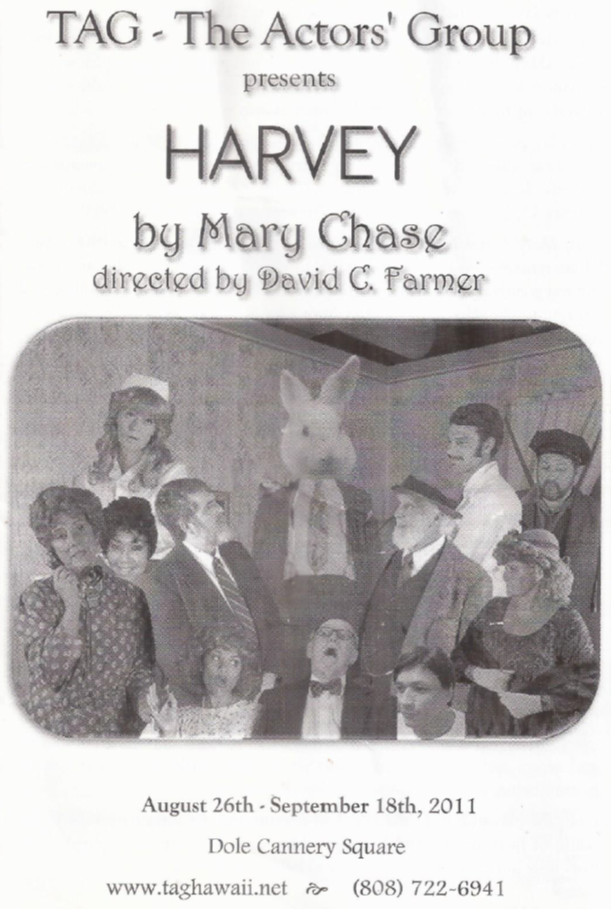
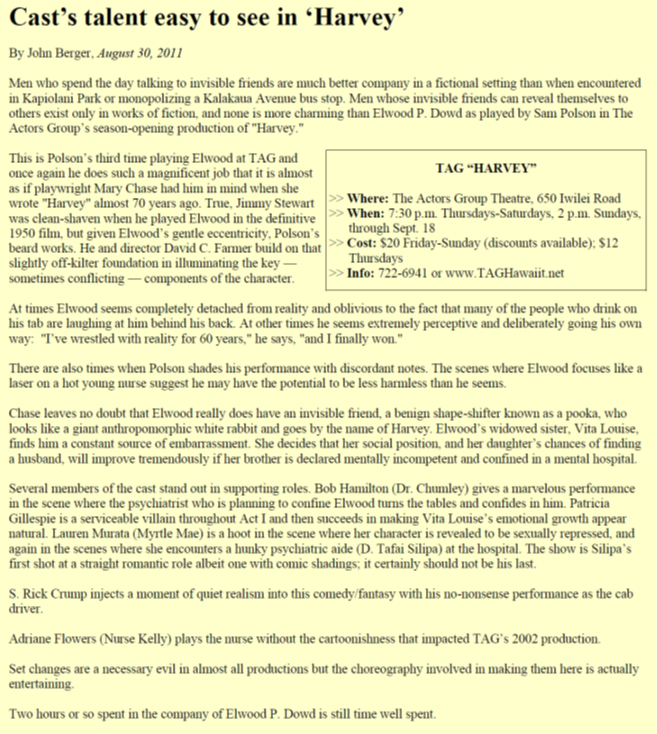
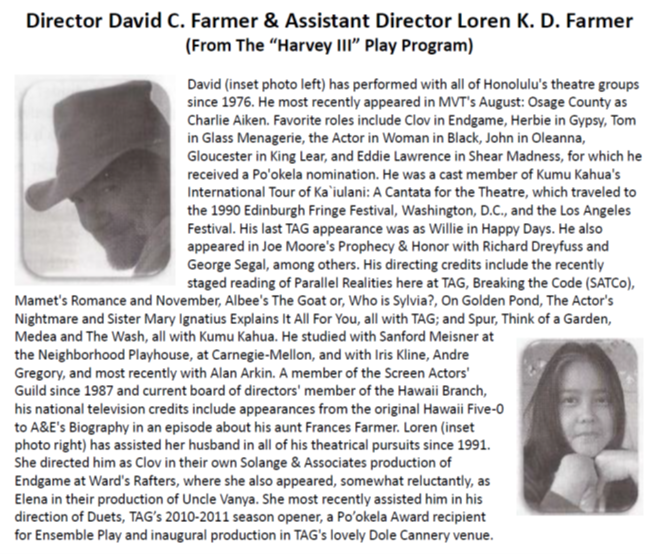


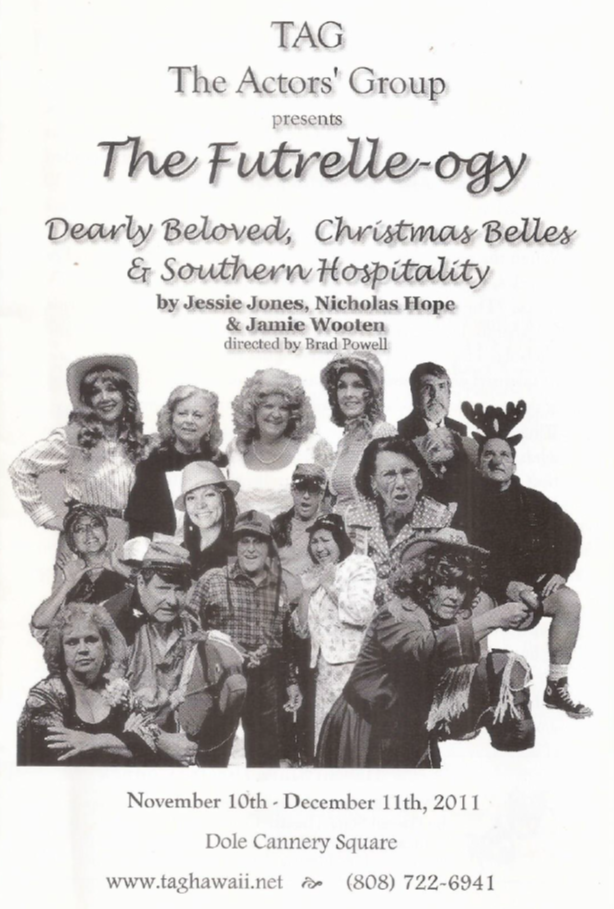
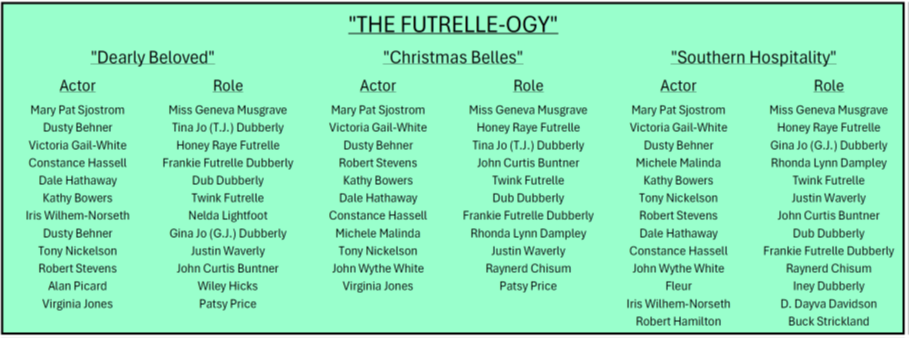

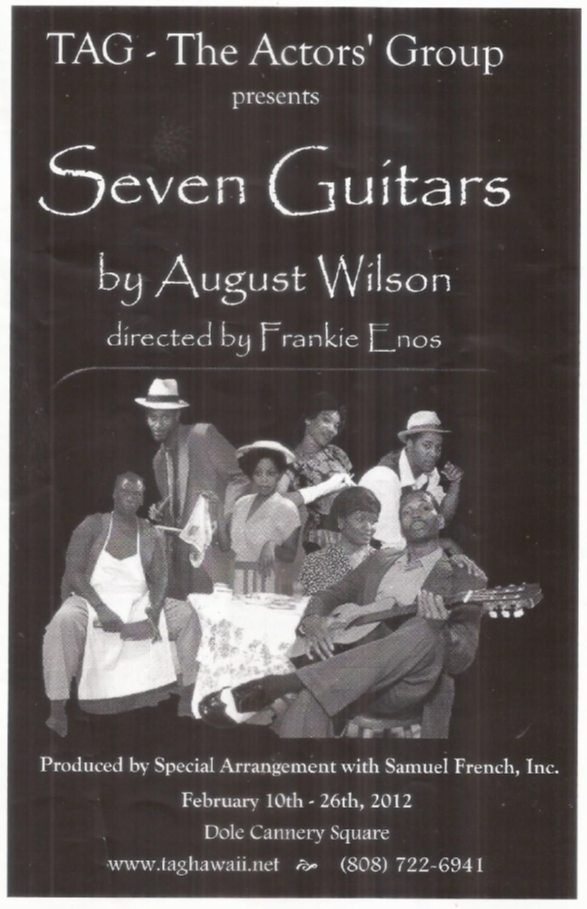
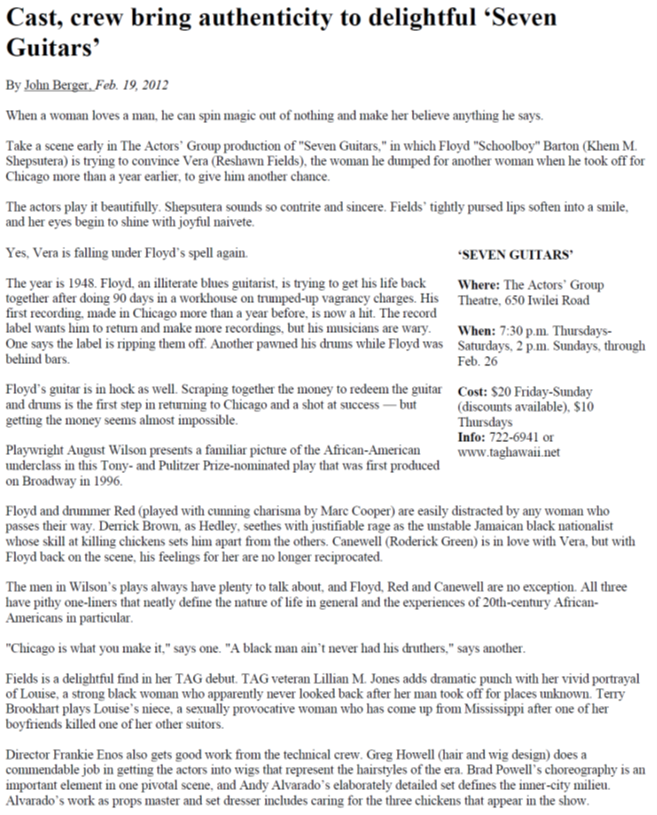
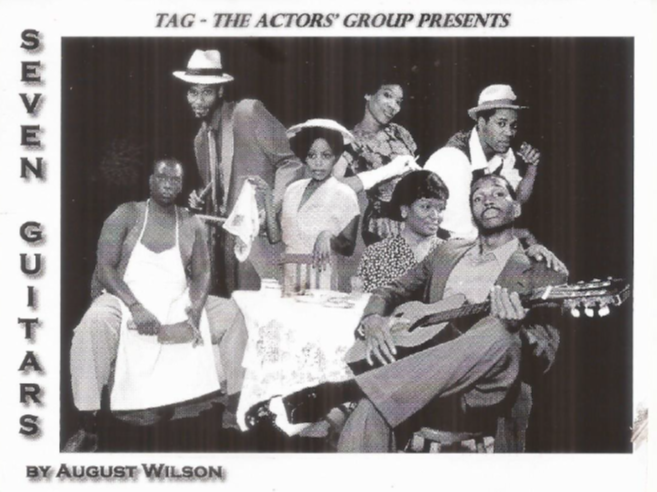

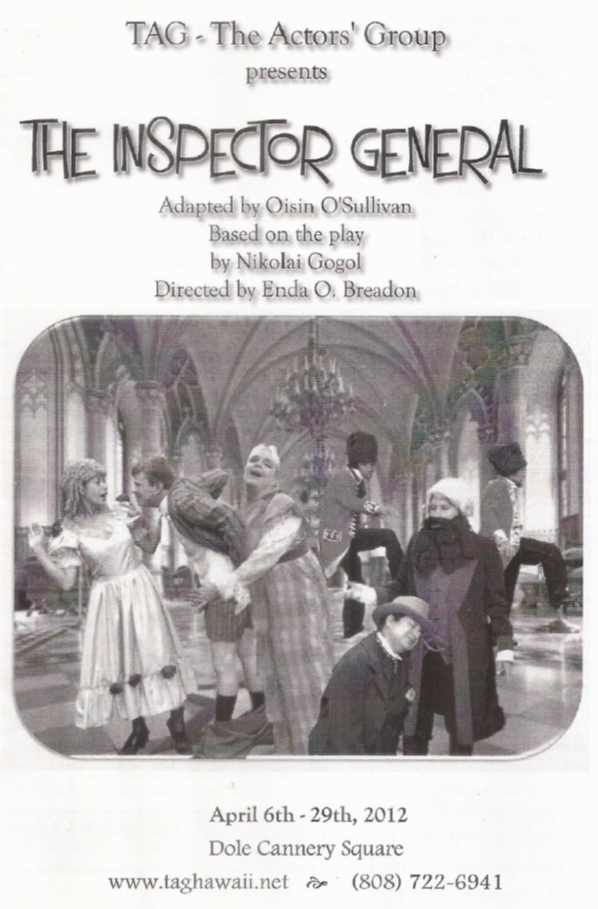

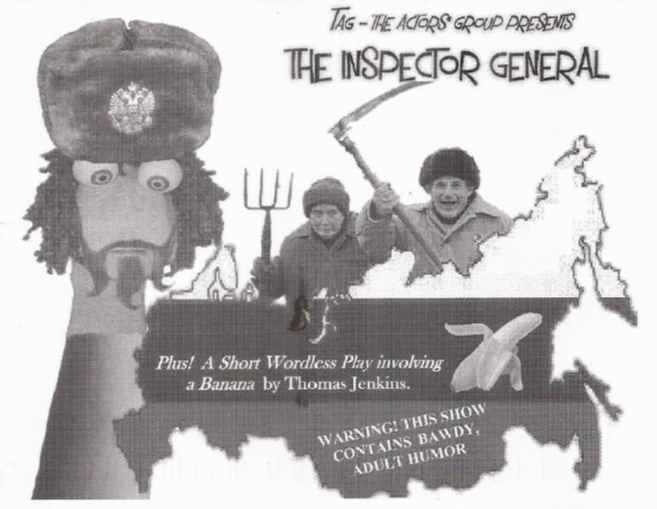

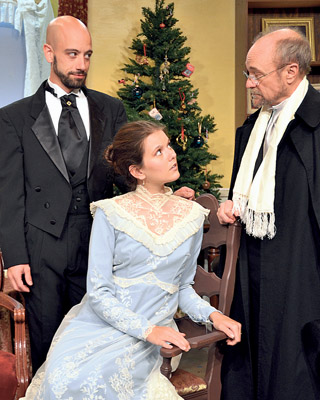
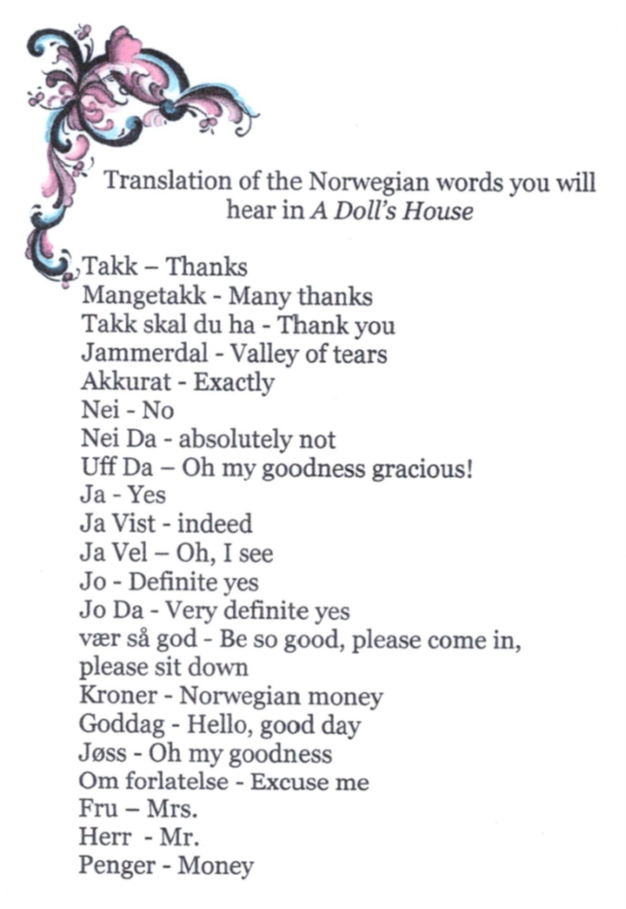
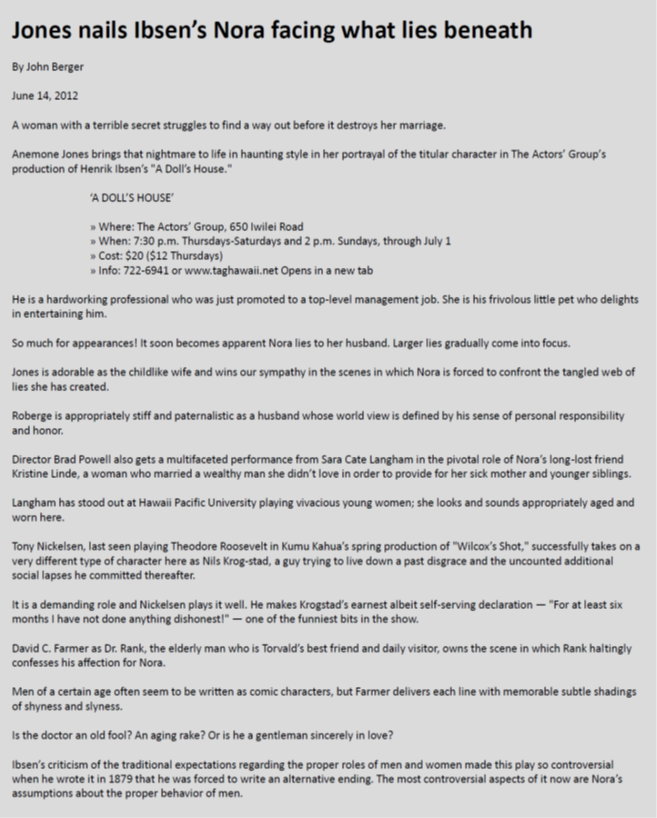
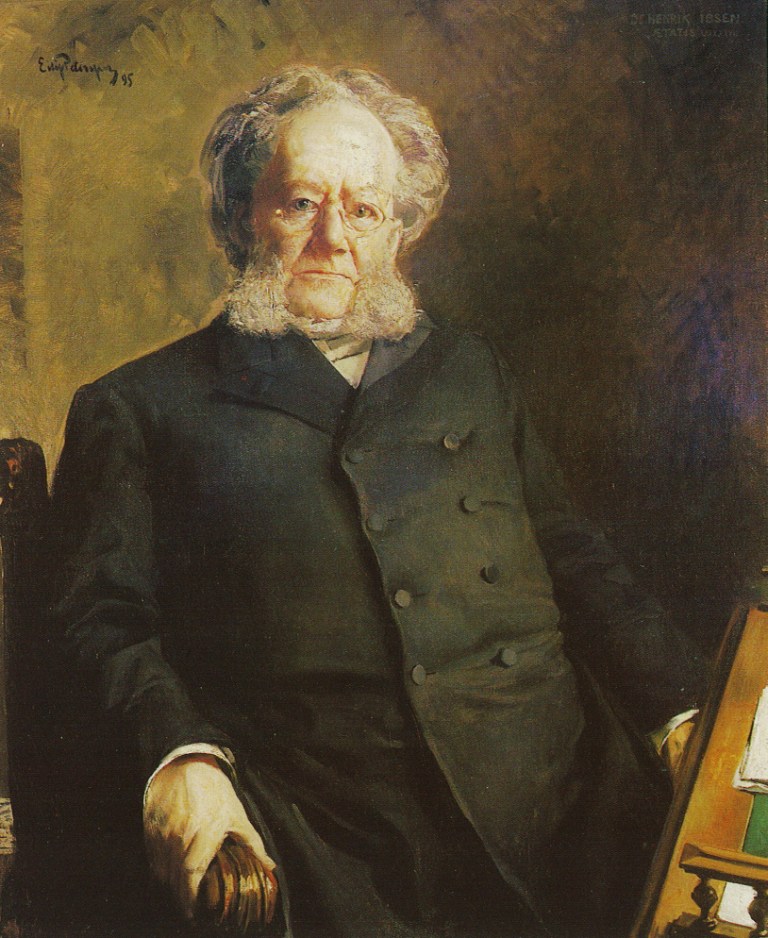

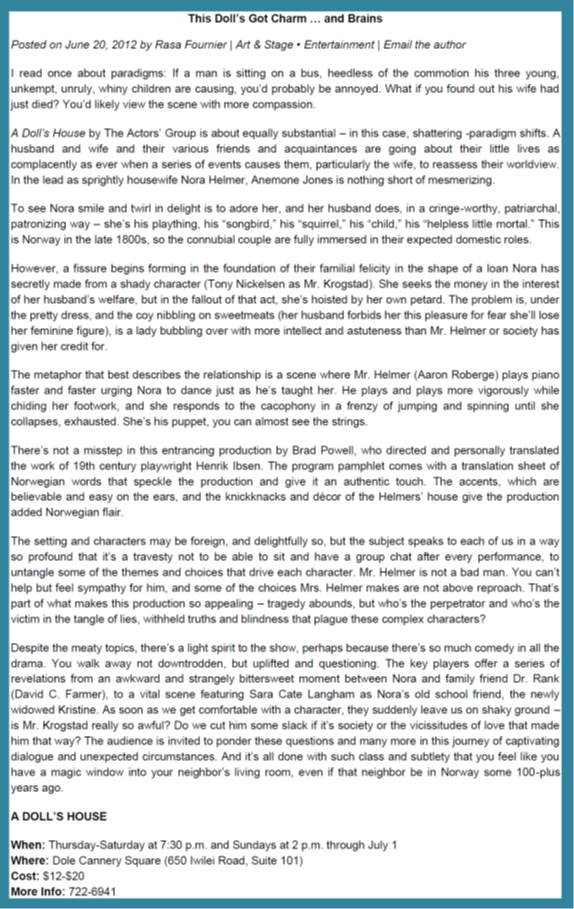
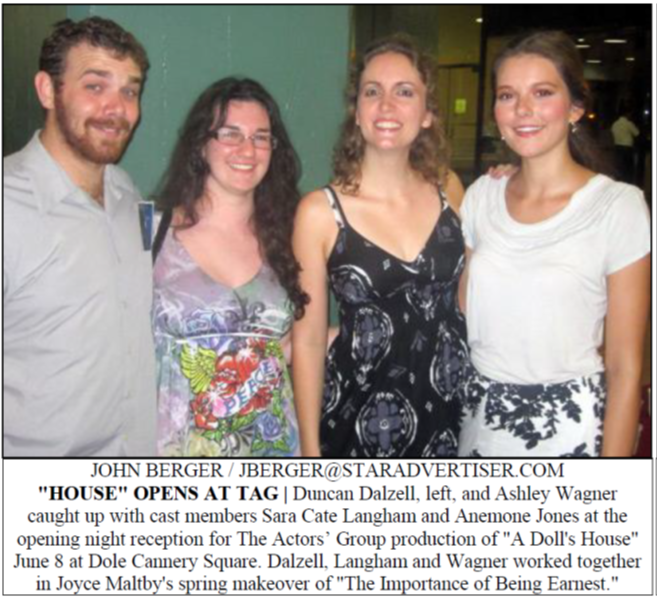
Comments are closed.